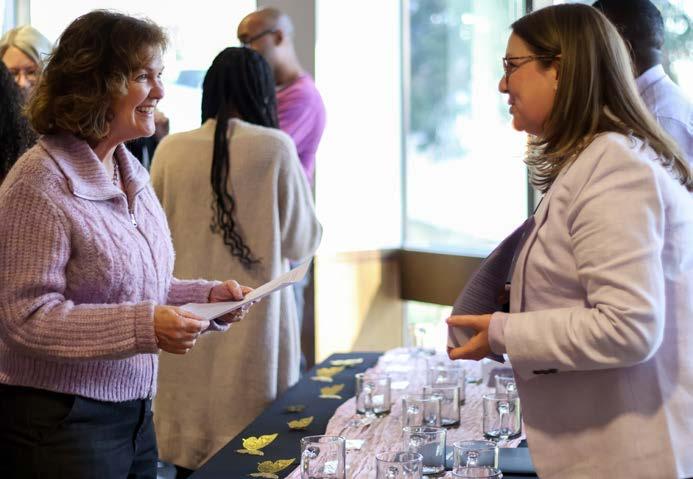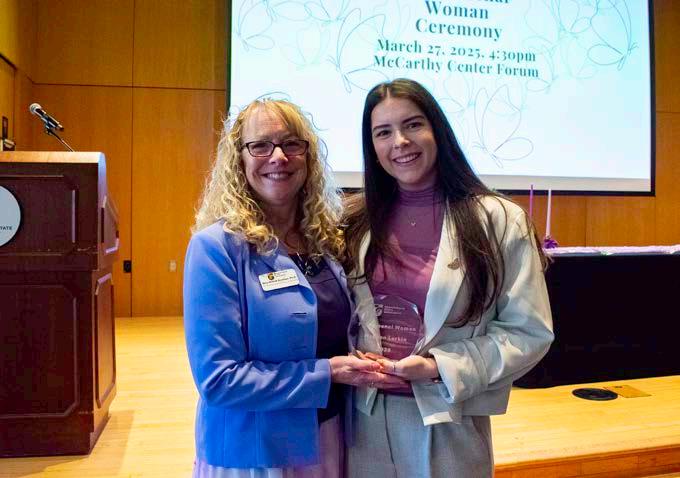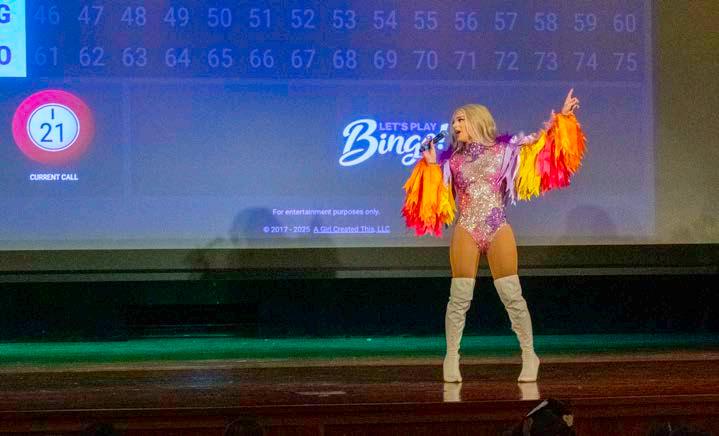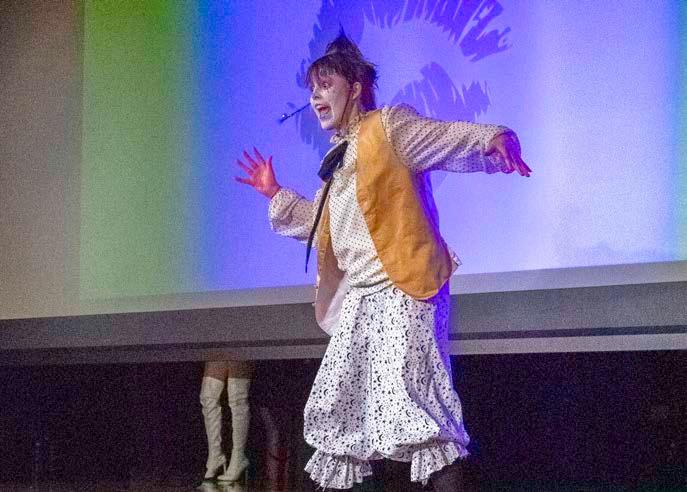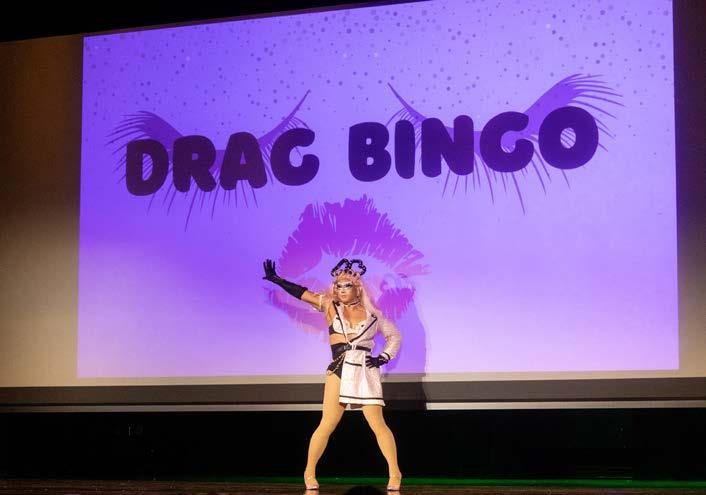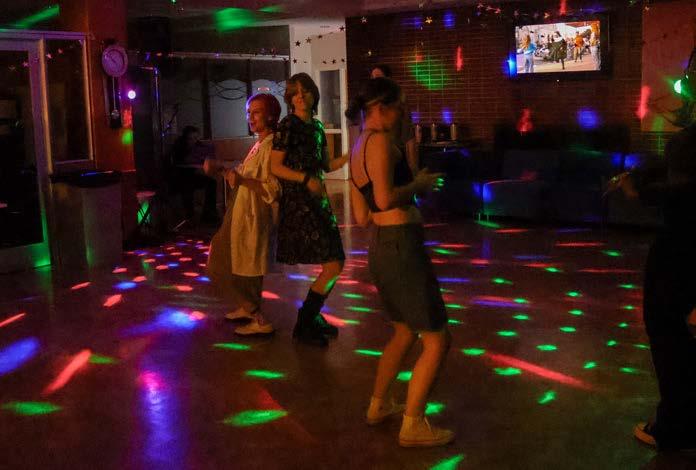
March 28, 2025


March 28, 2025
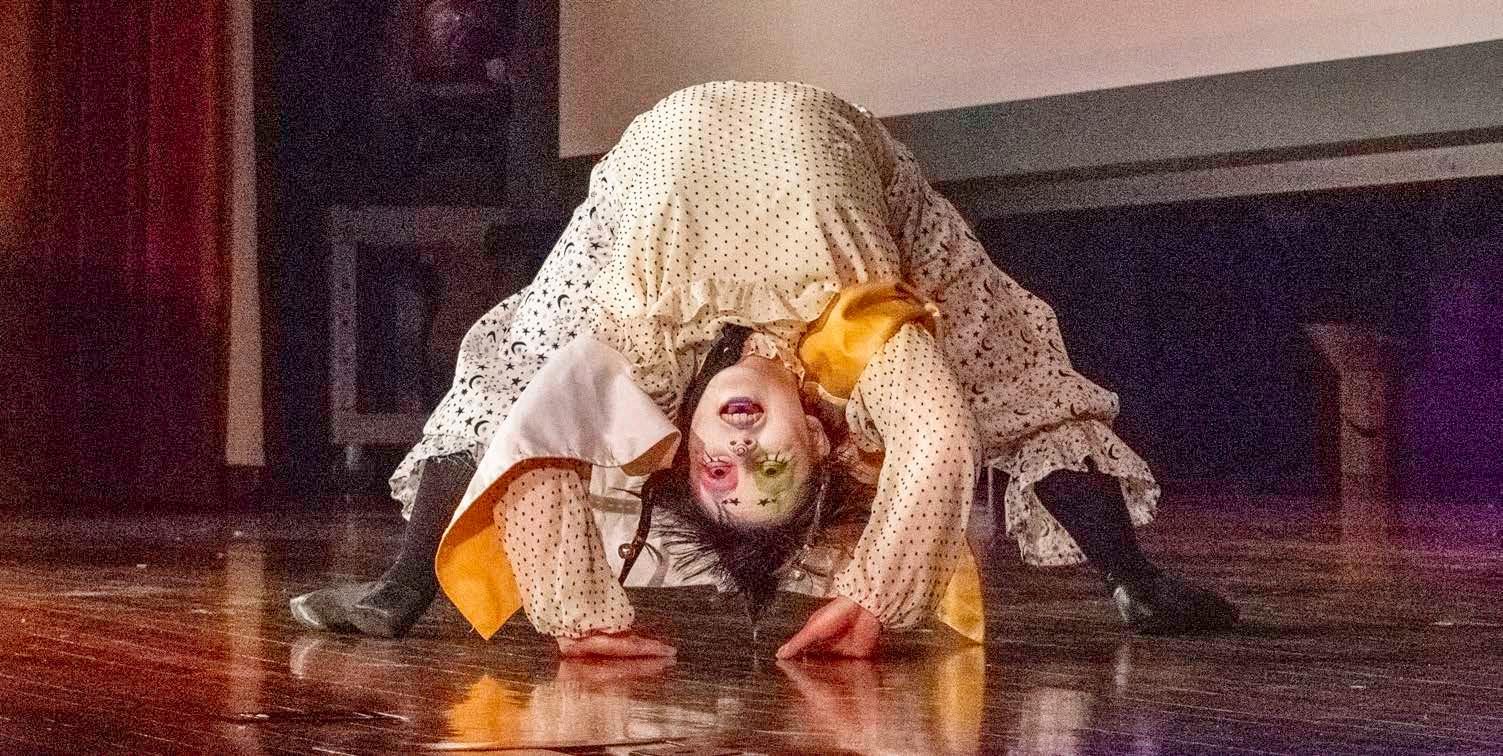
By Dylan Pichnarcik News Editor
The University Curriculum Committee (UCC) hosted an open forum for members of the University community to discuss the proposed new general education model March 14.
UCC Chair Michael Greenstein moderated the meeting, and attendees were allotted three minutes to speak. They were limited to one comment per motion until all participants who wished to speak were recognized.
During the meeting, Greenstein asked for the model to be voted on at a later date.
General Education Advisory Board (GEAB) Chair Patricia Lynne presented
the proposed general education model revision. Lynne said she and GEAB have been working on the revised general education model for two years.
Lynne outlined goals for the proposed GenEd model. She said general education must be attainable for students; develop students’ understanding of diversity; show balanced regard to arts & humanities, STEM, and social sciences; and include interdisciplinary study - which is a requirement for The New England Commission for Higher Education (NECHE) standard 4.17.
Regarding the proposed diversity overlay, “power, privilege, and resistance”, Lynne said, “General education, according to our goals, develops students’ understanding of diversity,
specifically human diversity, and this is something that has been called for by faculty, staff, and administrators for over a decade.”
According to NECHE’s Standards for Accreditation, Standard 4.17 states, “The general education requirement in each undergraduate program ensures adequate breadth for all degree-seeking students by showing a balanced regard for what are traditionally referred to as the arts and humanities, the sciences including mathematics, and the social sciences.
“General education requirements include offerings that focus on the subject matter and methodologies of these
By Dylan Pichnarcik Editorial Staff
Assistant Dean of Campus Engagement Rachel Spezia created the Women’s Student Leadership Network after seeing other groups hold similar programs.
She said a program did not exist at Framingham State.
Now administrators Nancy Niemi, Meg Nowak Boreggo, Stephanie Crane, and Lorretta Holloway, whose desks are piled high with paperwork, proposals, and problems concerning studentstake a moment to connect with female students on a personal level.
FSU was founded as an all-women’s
college and only began admitting male students in 1964, according to framingham.edu.
Sophia Harris, Adrien Gobin, Marlee Griffin, Rachel Rafferty, Caspian Barrett, Evelyn Campbell and Emily Crossin all have appointments to meet with these administrators and advise them on what it means to be a woman at Framingham State.
Mentors and mentees are required to meet three times but could continue if they desired, said Spezia.
Spezia said she hoped mentees were able to add another person on campus to their support network, “but also [their mentor] is someone who the mentee can go to outside of their normal person. So they get a different per-
spective and that it’s a relationship that can continue past many of the mentees graduating.”
Crossin, class of ’26, was paired with President Nancy Niemi.
Crossin said, “It has been such an honor to learn from successful women. President Niemi has given me a total boost in my confidence about entering the workforce as a young woman. It has been wonderful getting to know her and I have learned so much from her!”
She said she is hoping to build skills in networking, leadership, and professionalism, and she also wants to “learn as much as I can from an incredible woman. If I’m lucky, I could be as successful as her some day.
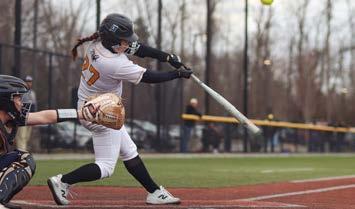
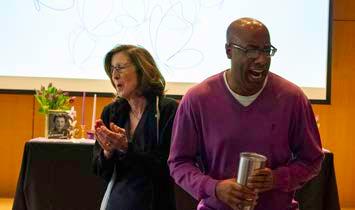
Editor-in-Chief
Sophia Harris
Associate Editors
Maddison Behringer
Ryan O’Connell
Copy Editor
Emma Lyons
Asst. Copy Editor
Allie Mosher
News Editor
Dylan Pichnarcik
Asst. News Editor
Bella Grimaldi
Opinions Editor
Izayah Morgan
Sports Editors
Izabela Gage
Sophia Oppedisano
Asst. Sports Editors
Taylor Kimmell
Kyra Tolley
Arts & Features Editors
Francisco Omar Fernandez Rodriguez
Owen Glancy
Asst. Arts & Features Editors
Sarah Daponde
Liv Dunleavy
Bella Omar
Photos & Design Editors
Adrien Gobin
Alexis Schlesinger
Asst. Photos & Design Editor
Meghan Spargo
Illustrations Editor
Ben Hurney
Asst. Illustrations Editors
David Abe
Ronnie Chiu-Lin
Emily Monaco
Staff Writers
Jesse Burchill
Raena Hunter Doty
Kristel Erguiza
Paul Harrington
Dan Lima
Antonio Machado
Kate Norrish
Erina Operach
Anthony Pintado
Alexandria Rose
Emma Schor
Anthony Sims
Michael Trueswell
Celia Williams
Staff Photographers
Eliana Buono
Meg Dame
Oné Green
Staff Illustrators
Charlotte Fabrizi
Marcus Falcão
Advisor
Desmond McCarthy
Asst. Advisor
Elizabeth Banks
By Bella Grimaldi Asst. News Editor
What is your academic and professional background?
My background is in biochemistry. I have a Ph.D. in biochemistry. I actually started off as a molecular biologist. So what does that mean? Really thinking about cells and how things in cells work together to make something alive. And I did a bachelor’s and a master’s degree in biology at Clark Atlanta University. It’s a historically Black university in Atlanta, Georgia, and I had some great professors there. It was a primarily undergraduate institution. They did have some graduate programs. So in many ways, it was kind of like Framingham State. The priority was teaching and then preparing students to go beyond their undergraduate degree. And I had some excellent professors there who really encouraged me to keep going, and I decided to get a Ph.D. from MIT here in Boston. That’s what brought me up here. I’m originally from St. Louis, by the way. I came to Boston for my graduate degree, and I stayed. I met my husband, got married, and kind of hung in there. I was looking for what to do next and I said, “I don’t want to go into that high-power research-one institution. I am kind of interested in a university like I experienced, and really think about how to mentor students and encourage them to continue with their education, or help them in thinking about their career path and what to do next, because I just had such a positive experience with that.” And so an opportunity came up to come here for a temporary position. And I said, “Let me try it out. I don’t know if I would like teaching or not. I want to see how it goes.” I’ve been here since 2011 and I’ve been enjoying it.
What is your teaching philosophy?
I think what I like to try to do now is to really think about what motivates students to learn, trying to figure out how to engage students in what we’re teaching them. Where do your interests lie? What are you interested in? What do you want to know more about? And by learning more about what students like to do, that’s how I try to incorporate what we’re teaching, how to con-
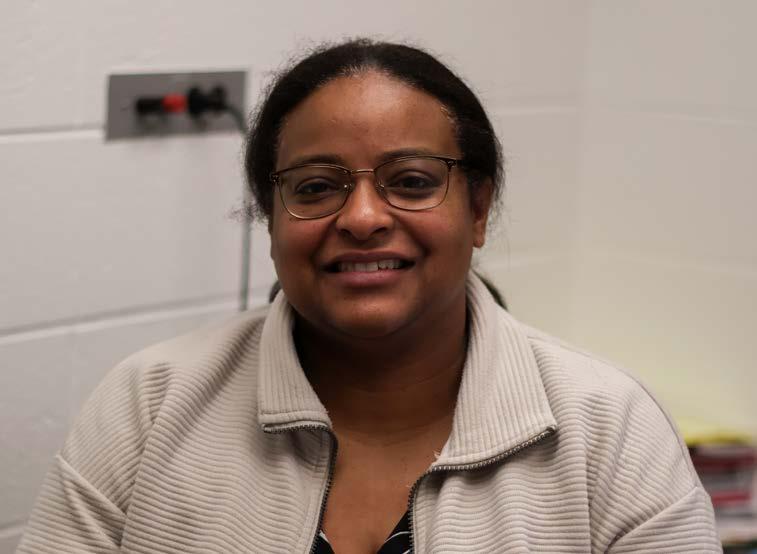
nect what you like, your interests, what motivates you to learn, to the material that we’re trying to teach. So that’s one thing that I’ve been really thinking hard about, how to do that even more. I’ve been thinking also about just building a relationship with students more. Just getting to know them. What’s your outside interest in general? We’re not just these empty vessels when we come into the classroom to be filled with all the science information. We’re human beings. Getting to know the student for who they are and how they learn. What’s the most effective way for them to learn and adjust accordingly to try to engage students more? So I’ve been doing a lot of that. I haven’t been teaching this year. I’m working in an administrative position through Academic Affairs, but I still work with faculty members and help mentor them on thinking about student engagement. We call it inclusive pedagogy. Just how to include more students in the classroom, their ideas, their interests, get more students involved in the discussion in the classroom, more active learning strategies.
What are your hobbies or something students wouldn’t expect about you?
I have twins. They are 10 now, and when you’re a mom, your own individual hobbies sometimes disappear. But what I’ve had so much fun doing with
Tuesday, March 25. 8:22
Trespass Tow
Corinne Hall Towers
Vehicle Removed / Tow
Tuesday, March 25. 3:27
Suspicious Person Hemenway Hall Check Completed
Wednesday, March 26. 10:11 K9 Community Outreach Dwight Hall Building Checked
them is playing sports. So we’ll go play basketball. We’ll play soccer. So now I’m learning how to play soccer from them, and they laugh at me because I’ll look up YouTube videos of all of the drills they have. So we have fun around that. I guess I would say hanging out with my family is probably my biggest hobby right now. They do take up a lot of the time outside of work. I try to volunteer when I get an opportunity. That’s been something else that I used to do a lot as a graduate student, and I haven’t had as much time to do.
What advice would you give FSU students?
This is something that someone told me when I was in school. They said, “Don’t let go of your passion. Find that thing that you can’t live without, whatever it is, and hold on to it.” Maybe it’s a passion for the sciences. Maybe it’s not. Maybe it’s a passion for helping others. Maybe it’s a passion for trying to bring information right to others through writing articles. Whatever it is, hold on to that passion. Don’t ever forget it. Success looks different for everyone, right? But if you’re contributing to that passion in some way, whatever it is, then that’s success.
CONNECT WITH BELLA GRIMALDI igrimaldi@student.framingham.edu
Wednesday, March 26. 2:13
Fusion Center Alert FSUPD Call / Assignment Complete
Continued from Page 1
three primary domains of knowledge as well as on their relationships to one another.”
The first component of the model is the “Core” courses. The four courses under this domain would be the classes “that we believe everybody should take,” Lynne said in an interview with The Gatepost published on February 21.
The classes under this domain are a RAMS first-year seminar course, a firstyear writing course, a math course, and a world languages course.
Students will have a choice of a specific core math course which will be dependent on major requirements. The math requirement must be completed within the first two years of matriculating at the University, according to the proposal.
The writing requirement, which is Composition II, must be completed within the first year of matriculating at the University.
For the world languages requirement, all students will be required to complete one semester of a world language. The proposed change includes a reconstituting of the learning objectives to take American Sign Language into account.
The second domain is “Distribution Requirements.” These classes consist of two arts & humanities courses, two social science courses, and two STEM courses.
According to the proposal, courses under arts & humanities “explore human culture, expression, and experience through artistic creation or through critical analysis and interpretation of cultural and artistic artifacts, historical events, and philosophical ideas.”
The learning objective of the courses under the social sciences requirement is exploring “human society and behavior through critical analysis of human systems and empirical data gathered using both quantitative and qualitative methodologies,” according to the proposal.
The learning objective of the STEM courses is exploring “the natural


Sunday night Mar. 30
Showers likely, mainly between 11 p.m. and 2 a.m. Cloudy, with a low around 40.
Monday Mar. 31
Showers likely, mainly after 1 p.m. Mostly cloudy, with a high near 70.
world, technology, mathematics, and finance through observation, experimentation, data analysis, and the application of mathematical models and technological applications,” according to the proposal.
At least one of these courses must still be a lab science course.
Students will now also be able to take a 300-level course for a general education requirement.
The third domain is the “Diversity” requirement. A student will have to take one course under the diversity domain.
Courses under the Diversity domain will be required to meet a “power, privilege, and resistance” learning objective and one additional category: “historically marginalized perspectives,” “global perspectives,” or “social justice.”
The “power, privilege, and resistance” courses “examine and critically analyze how differential systems of power and privilege shape social, economic, and/or political inequalities in local, regional, and/or global contexts across diverse and marginalized communities as well as consider collective and individual responses to forms of oppression and inequality,” according to the proposal.
[ Editor’s Note: For more information regarding the proposed GenEd model, see “New GenEd proposal under review” in the Feb. 21 edition of The Gatepost. ]
Subcommittee feedback
Before opening the floor for discussion, Greenstein outlined the discussions from the UCC subcommittee meetings from the previous week.
He said one of the three subcommittees requested additional time to meet and discuss the proposal and their respective “logs.”
According to Greenstein, concerns raised at the Subcommittee A meeting were that the proposed model “does not prepare students adequately for the present world.”
He said this point was made multiple times during the subcommittee meeting.
Greenstein said another concern raised at the meeting was about the
lack of interdisciplinarity in the proposed model.
He said attendees of the Subcommittee A meeting appreciated the flexibility of the proposed model but said it “is lacking any sort of incentive for participation by students in studio courses or in film and music courses in general.”
He added people at the meeting expressed concern that due to the current political climate, “Maybe we should be focusing more on things like the U.S. Constitution, rather than less on those things.”
Greenstein said another concern raised at the meeting was a “lack of focus” on oral presentation skills or distinctive teaching methodologies in Arts & Humanities in the new model. He added, “There was substantial discussion about the stance of World Languages in the general education model, concerns for both its positioning in the core or recommendations against that.”
Concerns raised at the Subcommittee B meeting were about “what it means to be a primary field of study, which needs clarification, both within the model and then for students and advisors to understand it,” according to Greenstein.
He added there was concern about “what it means that prefixes are defining things. Who defines prefixes? How are prefixes dealt with? And again, concerns that students and faculty don’t understand what prefixes are and how they impact the general education model as proposed.”
Greenstein noted additional concerns brought up at the meeting about math being included in the core as courses only taught by the math department, rather than including quantitative reasoning classes. Including quantitative reasoning courses would help transfer students who may have taken a course that qualifies for that core that was not taught by mathematics faculty in their previous institution.
“Members on Subcommittee C also had a substantial discussion about interdisciplinary courses, how they get treated, and concerns about whether this model is actually enhancing the use of interdisciplinary courses and how interdisciplinary courses are going to be created,” Greenstein said.
“There was discussion about lab requirements, whether they actually stay, or whether the model is firm in its staying.
“The distribution requirements lacked clear learning objectives. There was concern about the diversity objective itself, whether that should be in the core, and how it’s currently being treated as an overlay, and what that means,” he added.
Greenstein said there were concerns at the Subcommittee C meeting about whether teaching technology and the RAMS courses should be included in the model. Attendees of the subcommittee meeting also discussed whether 300-level courses should be included in the model and what that would mean.
Discussion of NECHE Standards 4.16 and 4.17
A motion was made by English Professor Kristen Abbott Bennett, UCC member, that the proposed model does not meet the NECHE 4.16 or 4.17 Standards. The motion was seconded by Professor of Art Timothy McDonald, UCC member.
Abbott Bennett said, “I see this model failing to meet them. … Right now, this model has no … civic literacy, which I think we need to [have] in 2025. There’s no technology requirement, which you absolutely need to prepare students for the world that they will live in.”
According to NECHE’s Standards for Accreditation, Standard 4.16 reads, “It reflects the institution’s mission and values and embodies the institution’s definition of an educated person and prepares students for the world in which they will live. The requirement informs the design of all general education courses, and provides criteria for its evaluation, including the assessment of what students learn.”
Abbott Bennett said, “The cutting back to one math class and to cut back on computational thinking, I think is also a failure to prepare students for the world that they will live in under the current Trump administration. In 2025, we’re seeing more censorship at the high-school level. If we are responsible for creating well-educated students, then a lot more is going to
See GENED Page 4
Forecast provided by the National Weather Service www.weather.gov


Monday night Mar. 31
Showers, mainly before 2 a.m. Low around 40.
Tuesday Apr. 1
Mostly sunny, with a high near 50. Northwest wind around 11 mph, with gusts as high as 20 mph.

Tuesday night Apr. 1
Partly cloudy, with a low around 30. North wind around 10 mph.

Wednesday Apr. 2
Mostly sunny, with a high near 45.


Wednesday night Apr. 2
A chance of rain, snow, and sleet. Mostly cloudy, with a low around 30.
Thursday Apr. 3
Rain likely. Mostly cloudy, with a high near 60.
Continued from Page 3
come down on us.”
She added, “To be fair, GEAB composed these logs before the administration, before all the censorship, but we’ll have to do a lot more heavy lifting to fulfill our motto, ‘Live to the Truth.’
Abbott Bennett said the proposed model “puts every department in competition with every other department, making scheduling a challenge.” She also raised concerns that students will be unable to get classes required for their major.
English Department Chair Lisa Eck agreed with Abbott Bennett that the proposed model does not meet NECHE’s standards.
Eck said, “There were so many good ideas flying around but when I came back from my sabbatical, I really didn’t recognize this model because of what is still missing and what it makes invisible to our students.”
She added some of the “good” ideas from her time on the GEAB committee, such as students having the chance to take creative courses, are “devalued by not having their own domain.
“Right now, we have a [proposed] distribution model where creative writing courses compete with history courses, digital humanities compete with literature courses, but it’s all just one big mix,” Eck said.
Eck said she was also concerned about “siloing the three schools” and that creative courses aren’t visible to students.
She said the current model is much more evenly distributed and is “much more rigorous when it comes to 4.17.”
Eck said voting on the current model “feels rushed.”
In response to the motion, Philosophy Professor Joseph D’Andrea asked if approving the motion would mean the proposed GenEd model would be “done.”
D’Andrea said he did not want to take a vote that “is in essence going to bury the whole proposal.”
History Department Chair Maria Bollettino said she thinks one of the “fuzziest” sections of 4.16 is what the University’s definition of an educated person is.
Bollettino said she is an advocate for a “civic literacy overlay.”
She added there was not a question in the general education survey that asked, “Would you like to see a civic literacy overlay?”
She said a question that was asked on the survey was, “Would you like to see expressive work completed by students?” The responses to that question “were off the charts … but that’s nowhere in our model.”
Bollettino said, “I think people are feeling like there’s a disconnect between what we do know we value as an institution, and what we expect in terms of the education of our students.”
History Professor Stefan Papaioannou, GEAB member, said “it’s hasty” to vote right now and say the proposed model doesn’t meet NECHE standards. “I think there would have to be a longer discussion, but I would say that it very much does meet those standards, and certainly more than our current model,” he said.
Fashion Design & Retailing Professor Laura Kane said based on the description of “skills in general education” on the framingham.edu website, students will demonstrate a critical understanding of human diversity, demonstrate a critical understanding of civil literacy, solve problems using creative thinking, and demonstrate technological competency.
Additionally, students will recognize ethical and social responsibilities and communicate orally effectively.
Kane said, “These are some of the things that we currently have defined as what embodies an educated person, and that is where I feel like this new model does not meet our definition of what we want our general education to be.”
English Professor Desmond McCarthy said the current model focuses on problem solving, critical thinking, communication, and preparing to be an informed citizen.”
The proposed model “favors disciplines, or at least colleges, over skills,” McCarthy said.
“I think a lot of skills and competencies are necessary to be a well-educated 21st century citizen - to have exposure to a range of skills that you need to be a good college student. I think this is very discipline-specific, and I just don’t think that’s what general education is,” said McCarthy.
Math Professor Matthew Moynihan said, “One of the struggles in this area is that when we discuss the current model and we reference learning objectives, we’re referencing something in this really nebulous state. Students are not required to complete learning objectives.
“Only 5% do, so it makes it really hard to say that our current model implements something if it is based on learning objectives. I also see some strong differences by college in how we approach this concept, and it makes me question, and I do mean this as a question, some of the comments about balance,” he said.
According to Moynihan, in the current GenEd model, there are 62 GenEd courses in STEM, 64 courses in Social and Behavioral Sciences (ESBS), and 129 courses in Arts & Humanities.
He said the math department has 11 GenEd courses that fall under Domain II-A. Biology, Chemistry, and Food Science have seven, which fall under Domain II-B.
“The English department has 31 courses - well, let’s say 30, set aside the writing - that fall into six of the eight different subdomains. We’re clearly looking at this very, very differently,” Moynihan said.
English Professor Rachel Trousdale said she thought the conversation was presenting the only options as keeping the model that the University currently has or moving to approve the proposed model as it stands.
“I recognize how much work has already gone into the model that’s proposed, but I feel that there are probably other alternatives. One of the arguments that I have been hearing, not in this meeting, but being made in general, is, ‘We’ve already put so much work into this model. We’d better go with it.’
“I don’t think that people who are
identifying difficulties are necessarily saying we have to stick with the existing model, but I think that we could valuably look at further alternatives, even though I recognize that’s a very painful thing to hear,” Trousdale said.
English Professor Bartholomew Brinkman said the proposed model will cause an interdisciplinary course such as Introduction to Digital Humanities to “fall through the cracks.”
He said the new model “does not seem to serve” interdisciplinary courses “as robustly as it could.
“I think there are some disciplines like English that are striving for that interdisciplinarity and have found that through those different subdomains,” said Brinkman.
He said, “It’s a little bit of a red herring to say that only 5% of students fulfill all the GenEd objectives and learning objectives, and therefore, the model’s not working.
“We didn’t really even know that until we went into review, which suggests to me that while that is something to address, either we bolster those objectives or we consider the current model without those objectives,” he added.
Brinkman said, “Largely, that model has functioned, and the GenEd objectives are sort of a separate issue.”
Mathematics Department Chair Michael Krul, GEAB member, said there is nothing in the proposed GenEd model that prohibits the introduction of additional overlays, such as the lab or the diversity overlay as they sit right now, specifically including civic engagement, technology, or oral communication.
He said GEAB did not believe they had the authority to make “those types of recommendations.
“There was no mandate for them in all of our survey data. We would very, very much like to see all of those things in this model. However, that’s something UCC should add, whether it’s this year or as the model is being implemented next year, just because we don’t really have an infrastructure for it,” he said.
Dean of STEM Lauren Nolfo-Clements said, “I really think we should have the conversation about why we would reject it [the proposed model] on these grounds, because this is very, very broad language, and we need to understand why people are not satisfied.”
After discussion, the motion made by Abbott Bennett failed, with eight members of UCC voting that the proposed model does meet NECHE’s 4.16 and 4.17 standards, while seven members of UCC voted that it does not.
According to Greenstein, abstentions were not announced per Robert’s Rules of Order.
Greenstein said the proposed model currently requires students to take a world language course.
Enrollment Management Vice President Iris Godes, UCC member, said there are few institutions that require students to take a world language as part of GenEd.
She said, “Typically, it’s attached more to particular majors where it is critical. And so it just concerns me
from a competitive standpoint that we continue to have that as a requirement. Justifying it on the recruitment side of things, it is a common question that students ask whether or not it’s required.
“Having worked at a school prior to here where it was not required, it was frequently asked, and when they were told no, it was a huge relief and kept us on the list,” Godes added.
World Languages Department Chair Emilce Cordeiro said, “I think that in our mission, we state that we need to serve the community we are in.”
She added around Framingham, “We have a desperate need for teachers and for people who speak the languages, especially Portuguese and Spanish, and we are not supplying the schools with the teachers they need.
“I really think that is going to be a disservice to our students if they don’t have a language requirement. We are always comparing ourselves with institutions that, in a way, are less rigorous,” she said.
D’Andrea said he supported the idea of keeping world languages in the model.
“It serves our goal of stretching the students toward diversity really well in the Framingham community and in the globe. It is the paradigm for thinking as someone from a culture that’s not your own,” he said.
World Languages Professor Ińes Vañó García said removing the language requirement would be counterproductive given the current political climate.
She said, “We need to educate ourselves about the linguistic landscape that we live in and act accordingly.”
Nolfo-Clements asked if the world language requirement could be “encompassed in a more broad diversity requirement that can be placed in the core.”
Dean of ESBS Susan Dargan, GEAB member, said the “power, privilege, and resistance” overlay in the proposed model “is not just about understanding another culture, but understanding the implications of power dynamics on cultures. So the class couldn’t just be on the mechanics of language. I would be opposed to that as a diversity goal because of what we intended for that goal.”
Anthropology Professor Benjamin Alberti said he supports having a language requirement in the proposed model.
He said not having the requirement is “going in the wrong direction in terms of educating our students. I’d also like to support Emilce’s point that our population here makes absolute sense that we have a language requirement.”
Another open forum will be held on April 4.
[ Editor’s Note: Desmond McCarthy is the advisor for The Gatepost. ]
By Sophia Oppedisano Editorial Staff
The Board of Trustees discussed how changes to federal funding will impact the University, the closure of the International Education Program, and an amendment to the Danforth Founding Agreement at its March 26 meeting.
Both President Nancy Niemi and Vice President of Administration, Finance, and Technology Robert Totino provided updates on actions taken by the federal government that may have an impact on higher education, including in the areas of student loans, civil-rights enforcement, and data collection.
Niemi said the Massachusetts Attorney General’s Office is joining forces with other state attorneys general to file an appeal and an injunction against the closure of the Department of Education.
Massachusetts Attorney General Andrea Campbell co-led a coalition of 20 other attorneys general “in filing a motion for a preliminary injunction as part of their lawsuit to stop the dismantling of the Department of Education,” according to mass.gov March 24.
This lawsuit follows President Donald Trump’s executive order directing the closure of the department and the immediate transferring out of student loan management and special education resources, according to mass.gov.
According to Niemi, the University has “not felt any impact of these actions that were taken, but we’re paying very close attention.”
Niemi said if federal student loans are transferred from the Department
nancial aid.
“Everything we’ve heard is that, in the Department of Education, that is not on the table. That falls in line with other areas, such as Social Security,” Totino said.
The Business Office is working closely with “principal investigators” on campus who are communicating with necessary departments on a weekly basis, including the Massachusetts Department of Elementary and Secondary Education (DESE). “Everything they’re hearing is positive at the present time,” Totino said.
“We hope that will run its course through the end of this fiscal year, and then we’ll see how that impacts budgeting for FY 2026,” he added.
Trustee Lino Covarrubias provided a report for the Student Experience Committee detailing the committee’s recent conversations concerning students’ mental health.
Covarrubias commended the Counseling Center for the work it does on campus and cited a campus survey in which students said access to mental health services aided them in being successful at Framingham State.
“I think the ability for the University to provide easy access to mental health services is really important, not only for recruitment, because the word does get out, but also retention and persistence to keep students here,” he said.
Covarrubias also noted a committee discussion about students’ basic needs, including food and housing insecurity.
Many students qualify to use the Supplemental Nutrition Assistance Program (SNAP), a federal food stamp program that Covarrubias said will
“It’s been a very tumultuous time with the presidency as far as many of the actions that they have taken since the inauguration.”
- Robert Totino
Vice President of Finance, Technology, and Administration
of Education to the Small Business Administration, “That is a highly complicated set of loans that need to be dispersed and acted on that would be transferred to a new place, which would have implications for many students around the country - including ours.”
She also noted “speculative” trickle-down effects, including the issue of redirected civil-rights enforcement and data collection.
Totino said, “It’s been a very tumultuous time with the presidency as far as many of the actions that they have taken since the inauguration.”
He added the University is “closely following” how those actions will affect the Framingham State community.
According to Totino, the University receives $25 million in annual federal funding, 80% of which is student fi-
University that outlines a teach-out plan for the Master’s Education in International Teaching and Educational Leadership Program.
The students who will be displaced because of these program closures “are all international students taking courses in different countries through these programs, and all of them are online,” Niemi said.
Niemi added NECHE and the Massachusetts Department of Higher Education have been made aware of the program closures and have approved the teach-out plans.
“Some of the students in the programs are unhappy with these decisions. We have addressed their concerns to the extent possible, and we are assured that we’ve helped as many as we can complete the programs that they can, and provided a pathway to completion with the others,” Niemi said.
Niemi provided an update on the Stearns Reservoir Project and alerted the Board that the University has decided “after looking at risks and benefits” to terminate its involvement as the lead partner for the project.
Framingham State filed documentation with the state in 2018 and 2024 to use the Stearns Reservoir, located a half mile from campus, as a public resource for the University.
Niemi said she and Jeffery Coleman, vice president for diversity, inclusion, and community engagement, met with
the Nipmuc tribe to let them know the University would no longer be involved in the project. She added the tribe was “very happy that we talked to them and they understood why we did not feel like we could go through with it.”
Niemi noted an assignment and amendment to the Danforth Founding Agreement in which “the Danforth Art Alliance’s (DAA) responsibilities will become assigned to the Framingham State University Foundation. The Danforth Art Alliance board members will become voting members of the Danforth Art Center Advisory Board (DACAB).”
All of the funds from the Danforth Art Alliance, an amount not exceeding $5,000, will go to the Framingham State Foundation for Danforth use only, Niemi said.
All three parties, the DAA, DCAB, and the Framingham State Foundation, all voted separately to approve the change to the founding agreement and the Board of Trustees was the last approval needed to pass the amendment.
The amendment passed unanimously.
The Board voted on their slate of officers for AY 2025-26. The Board unanimously voted to reinstate Anthony Hubbard as chair and Claire Ramsbottom as vice chair.
WITH SOPHIA OPPEDISANO soppedisano@student.framingham.edu
most likely be taking cuts in the near future.
“Here at the University, three out of five students are experiencing some sort of food or housing insecurity, which is about 59%. When you add mental health, childcare, transportation, and tech access, it increases to 73%,” Covarrubias said.
“We’ll have to really consider when those cuts do come, and they will come, how that’s going to affect our students. … I think the University is really on the forefront of all these when it comes to mental health and basic needs, but I think the needs will increase, and we have to really be on top of that,” he added.
Niemi updated the Board on the closing of the International Education Program.
Niemi said there is a signed articulation agreement with Fitchburg State
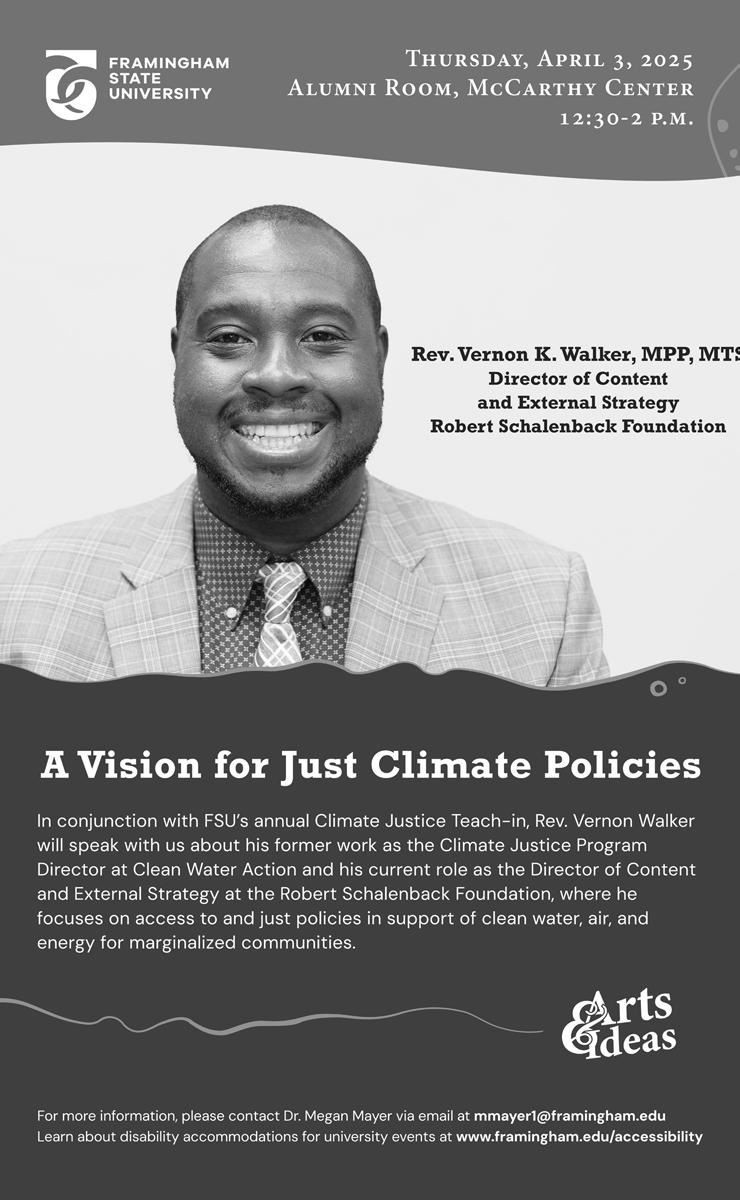
In the current political environment, there has been a lot of legislation threatening women’s rights. Roe v. Wade was overturned in June 2022 - a decision still sending shock waves throughout the United States as abortion access continues to be taken away from women stateby-state.
However, women across the country have not been complacent and continue to fight for their rights. It is so important, especially given the threats against women’s rights from the current federal administration, to stand together and push back against the patriarchy.
Thankfully, the Framingham State campus has no shortage of women who empower our community every day through their work.
Our University has historically supported and empowered women.
Founded in 1839 as Lexington Normal School, this women-only institution was dedicated to educating women as the first public teaching college in the United States.
We are lucky to have an administration filled with women in some of the top leadership positions: Nancy Niemi, the University president; Kristen Porter-Utley, provost; Keri Ann Sather-Wagstaff, associate provost; Meg Nowak Borrego, dean of students; and Lorretta Holloway, vice president of student success, to name a few.
It is crucial to recognize the University’s women leaders because through their work in their respective roles, they empower all women on our campus.
Even if we do not recognize it every day, having so many accomplished women running our University shows students and the local community that women are amazing leaders who belong in these roles. Students on our campus can look to them and know they, too, can be leaders.
Even beyond the administration, our campus has a substantial number of women in faculty and staff positions across different departments.
Our campus also hosts events that serve to empower the women in our community who make FSU a better place. The Dean of Students office sponsors the Phenomenal Woman Ceremony, which is held every March, to celebrate the women in the campus community.
Both students and faculty are able to
Have an opinion?
nominate members of the campus community who inspire and uplift them. A nomination can be awarded to a student, professor, or staff member whom their nominator believes best defines the word “phenomenal.”
The nominations are hand-delivered - complete with purple flowers and envelopes. Purple represents the women’s suffrage movement and International Women’s Day, which is celebrated March 8.
This event, which was first hosted in 2007, is inspired by a Maya Angelou poem of the same name, “Phenomenal Woman.”
In addition to the well-deserved recognition women at Framingham State receive, there are also University programs in place to support women on campus through departments such as the Health and Wellness Center.
The Health and Wellness Center offers cervical screenings and birth control prescriptions for all matriculated students free of cost.
In an era when these basic needs are under attack at the federal level, it is a sizable weight lifted off students’ shoulders to know their university stands beside them and is concerned about their health.
Departments such as the Center for Inclusive Excellence help celebrate and uplift women of color, and many student affinity groups provide safe spaces for BIPOC women to share their stories with peers.
Balancing a full-time course load, a job, familial responsibilities, and other relationships can be incredibly challenging, but for women on campus, this has become even harder since the election.
Many women have felt personally attacked as their rights to their bodies, their vote, and their place in the workforce have been called into question by the new administration.
The Gatepost Editorial Board is grateful to Framingham State for striving to preserve the rights of the incredible women who are working and learning on our campus.
We encourage our peers not to give up and to celebrate each other this Women’s History Month.
Feel free to email it to: gatepost@framingham.edu Opinions should be about 500 words. Anyone can submit. We look forward to hearing from you!
By Izayah Morgan Opinions Editor
The Department of Education (ED) prides itself on student achievement and accessibility to all students on a merit-based system - open to all races, genders, sexualities, and religious affiliations.
This provides equitable access for all involved and helps to shrink the already significant wealth disparity in America. It’s not a perfect system to fix the problems within the education system, but I believe it’s better than leaving it entirely to the states.
Currently, the ED is in shambles, and universities all over the country are panicking. According to the New York Times, the Department of Education has fired 1,300 workers. This is a part of the Trump administration’s initiative to dismantle the ED.
The argument this current administration is making is that it wants to leave educational funding up to the states. While this statement sounds fine on its own, it leads to drastic disparities in what states offer and what opportunities students can have.
Looking at myself as an example, I grew up in Section 8 housing with a single Black mother. Living off one check a month from social security, I was only able to attend college because most of my schooling was paid for by grants and scholarships.
Millions grow up in situations just as bad or worse than mine. I have friends who grew up in the same apartment complex and lost themselves to drugs or the law.
Education is one of the most potent ways to bring yourself out of that situation.
However, if we leave it up purely to the states, then we will see a drastic difference in how people are educated.
I mean, we already do.
Do you think someone going to a school in a wealthy district

rest of the popu- lation to become even more unedu- cated.
Limited education leads to idealization and devoted loyalty to those in power, something that authoritarian leaders in our past have used to gain mass followings.
When Trump won the GOP in Nevada in 2016, he said something that stuck out to me stating, “We won the evangelicals. We won with young. We won with old. We won with highly educated. We won with poorly educated - I love the poorly educated.
We’re the smartest people. We’re the most loyal people.”
To me this was the plan from his first term - to attack education.
Again, the argument is that the administration wants to leave education up to the states, but this already is the case. The Department of Education is there to make sure everyone gets a fair chance.
Due to systemic discrimination, communities of color have lower household income compared to white communities. Education is one of the most potent ways to even that gap.
It’s not a coincidence that as education is becoming more diverse, in terms of its students and staff, it’s under more scrutiny than ever.
Anti-intellectualism is on the rise. Anti-intellectualism breeds an uneducated population and ignorant people, leading to a cycle of poverty and lack of empathy.
By Emma Lyons Editorial Staff
In my 20s, I’ve become comfortable expressing how I feel - good, bad, and everything in between.
I was not always this way. As a teen, I would hide every emotion I believed I would get judged for.
The emotions I would hide the most were romantic. Twelve-year-old Emma would rather have died than have told that one boy she liked him. While my fellow classmates were having their first kisses and first relationships, I was trying to hide any crush I had - and I was probably doing a bad job.
My fear of rejection controlled my entire middle- and high-school life. It is a super isolating feeling in the moment but looking back, I now know it’s very common.
According to an article published by the University of South Wales, “‘Social rejection’, as it’s known in psychology, is an innate fear that we’re programmed on an evolutionary level to avoid.”
Everyone has a fear of rejectionno one enjoys being rejected, romantically or socially - it is ingrained in our minds and our society.
While humans have this innate fear as a way to protect ourselves, we can’t allow it to control our lives or stop us from going after what we want.
Two years ago, I had a crush on a friend and decided to tell him I liked
him. I was terrified and scared it would ruin our friendship, but I told
dating, I still wonder if we would have ended up together if he didn’t reject

me was finally off my chest. I didn’t have that excessive worry.
I was super lucky, though, and a week later he told me, “I like being around you too much.” He said he did want to be in a relationship with me. After two years of
always sit and wait for the person you like to ask you out. I spent my entire time in high school doing that and all I got out of it was being led on three times - by the same guy.
Being open about your feelings
and being open to rejection is the only solution. It’s terrifying and overwhelming in the moment, but it feels so much better to get the weight off your chest.
Plus, it’s not worth your time to put all your energy into someone who doesn’t like you. Getting rejected is just a door closing that was never actually opened. Moving on from someone who isn’t interested in you will help you find someone who actually is - which is what you deserve.
Pushing back against fears of rejection aren’t exclusive to romantic relationships either.
Everyone has that one friend they only talk to in class - ask them if they want to grab Dunkin’s after class, or hang out over the weekend. They might say yes, and you could form a new friendship.
Ask the group you hear in the dining hall talking about your favorite show if you can join in on the conversation.
If you see a girl wearing a shirt or shoes you have been looking to get, ask her where she got it.
There are so many opportunities to share your feelings every single day. Most of them are passed up because we are afraid of social rejection.
You can’t let a little rejection hold you back from sharing who you are. If you open yourself up to it, you never know who might say yes.
Even if the answer is no, you’ll be better for it.

“A woman who inspires me is Meg Larkin. She’s my supervisor. She works up in EXP. She’s the director of orientation. Every time I talk to her, it’s always a fun time. ... She really pushes me to do my best!”
- Paige Rainville, junior
“Chappell Roan because I love her confidence. I feel like she’s just what we need in the world right now as a celebrity.”
- Iris Wolfharth, freshman
“Who is a woman who inspires you, and why?”
“My mother. She’s really a nurturing woman. Just by her struggles and her being here, she kind of paved the way for me and raised me to be the man who I am today, and my siblings as well. And I look up to my sister. She’s a really good inspiration. She’s at school in Europe, so I’m really proud of her.”
- Ivan Nyantenji, senior
“Melanie Martinez because her music I’ve always resonated with. She talks about women’s rights in a way that expresses her creativity … by doing fantasy-related things in her music videos and her songs. I just feel like it’s really powerful.”
- Sarah Snyder, sophomore
“Definitely my mom. She did it all by herself, and she shows me every day that you can do anything by yourself.”
- Laila Jenkins, sophomore
“My mom. She’s had lots of ups and downs through life, and she’s always finding ways to give back to people. It’s pushed me to go into the career I want when I graduate. I’m going to law school.”
-Isabella Cambece, senior
By Izabela Gage Sports Editor
The Framingham State softball, baseball, and lacrosse teams traded the lingering New England winter for the Florida heat this past spring break, each going on the road to face new competition and strengthen their bonds.
With packed schedules and fresh opportunities, all of the teams were excited for a week of hard work, playing the sport they love, and relaxation with their teammates.
The women’s lacrosse and softball teams each rented a house for the week.
The baseball team had four condominiums rented out next to each other, and the team was divided by their positions, according to freshman middle infielder Camdon Bradford.
The women’s lacrosse team played two games in Panama City, Florida, and won one of the two games. They returned to Framingham State with an overall record of 2-4.
Junior Kelley DeBellis, a member of the women’s lacrosse team, said her favorite activity on the trip was “spending time at the beach with my teammates after morning practices. Getting a break from that brutal New England winter was needed.”
DeBellis said the team had dinner together every night on the trip and played card games together. “Just being around the girls and laughing automatically brings us closer.”
Maggie Grout, a senior on the women’s lacrosse team, said that after living in a house together, “The team is definitely much closer because people bond or get close to someone who they weren’t as close to before the trip. All the time we spend together has helped our connections on and off the field.”
She added, “It created an environment of teamwork and good communication. Whether from cooking meals and sharing stories, to playing games together, or just relaxing post practice or game.”
DeBellis said the best part of the Florida trips every year is “how close we all get as a team. We are with each other the whole break, so it really does bring us closer and helps us on and off the field when we create stronger team chemistry.”
Grout said her favorite part of the trip this year was “being at the beach with all my teammates and going in the ocean.”
She said after she graduates, she will miss “getting to live in a house with all my best friends and play lacrosse together in such an awesome place!”
DeBellis said, “I’d love to compete with other teams outside of New England - it would make the game so much more diverse.”
Grout said playing teams they typically don’t play “is a really fun way to challenge yourself against a style of play we may not see in Massachusetts.”
The softball team played 10 games in Clermont and Orlando, Florida, and won eight of them. The team arrived back in Massachusetts with an overall record of 9-3.
Jocelyn Pepe, a freshman on the softball team, said her favorite memory of the trip was “beating Endicott in our last game, because it was something the upperclassmen were looking forward to.”
She added that it felt nice for the underclassmen to help work for and earn a good win.
Pepe said her favorite activity on the trip off of the field was when the team would sit together by the pool. “We would talk for hours, and it was just so fun bonding with everyone.”
Graduate student Makayla Rooney, a member of the softball team, said her favorite memory of every trip is “getting coach to get us ice cream, even if he doesn’t want to.”
Pepe said sharing a house for a week “made us so much closer because we would just hang out in each other’s rooms and talk for hours. We all feel like better friends now than ever before.”
Rooney said her favorite part was
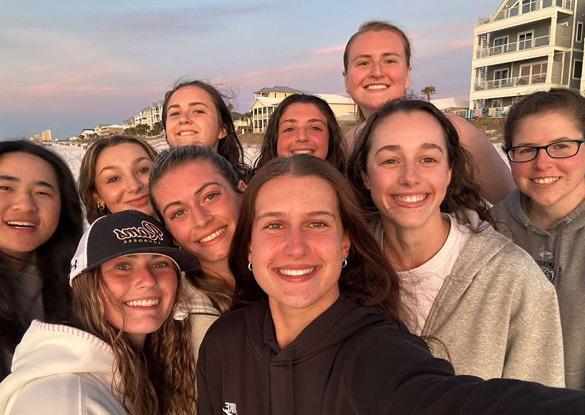
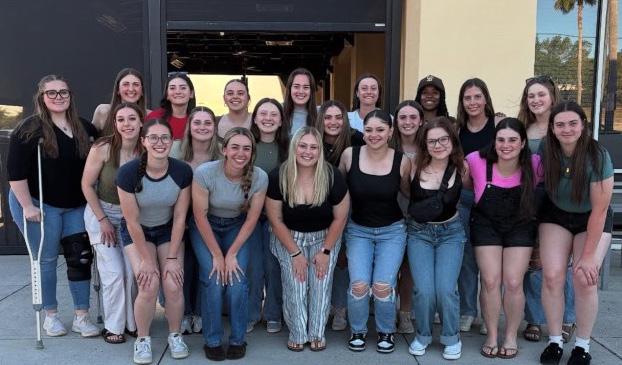
being able to spend off days hanging with her teammates and “because we really only see each other at softball … it’s nice to be able to talk about what they do outside of softball, what their hobbies and stuff like that are.”
Rooney said what she’ll miss after graduation is “spending quality time and not just being on a field, being locked into a game - just really getting to know the people that you are with. They’re your second family outside of your own.”
Playing in Florida gave the freshmen a chance to learn from the upperclassmen in game situations, Pepe said.
She added, “I think it helped the freshmen get good reps without it being too scary because we weren’t in conference play yet.”
Rooney said she thinks connecting off the field is “just as important, if not more important, than on the field, because if you don’t connect off the field, you’re not going to connect on the field.”
She added that the team bonding “really helped us in our games in Florida.”
Pepe said living together “helps build trust between us that our teammates always have our backs no matter what and that the care we have for one another extends beyond the field. We care about each other as people and not just softball players.”
She said playing teams from places outside of New England is a “cool experience because you get to see what the atmosphere is for them and if the standard they set for playing are different depending on where you’re from.”
Rooney said, “Seeing faster pitching and more ball movement and the speed that other teams and different states might play are a lot different than we do. So I think seeing that and adjusting to that will make our season a little bit easier.”
The baseball team lost all nine games they played in Auburndale and Winter Haven, Florida, and came back to FSU with a 1-11 overall record.
Bradford said he enjoyed the time the entire team spent together off the field.
“My favorite activities were obviously the games we played, as well as hanging out with the team and taking advantage of the warm weather,” he added.
Lucas Basile, a senior on the baseball team, said the best part of the trip each year is “taking the field every day. We only have to worry about playing baseball. Just getting up in the morning, seeing my teammates in our condos, and getting going.”
He said his favorite memory from this year was when the team played two nine-inning games in one day.
Basile said the team living together creates a supportive environment. “You understand the guys’ quirks, and if they’re feeling down, you go and support them, or if they’re up, you keep cheering them on.”
Bradford said he thinks the team living together helped build chemistry. “It forced us to spend time with people that we wouldn’t normally spend time with, and I know that a lot of guys got a lot closer during the trip because of this.”
He said, “The Florida trip definitely helped a lot of freshmen like myself, because we were able to let different guys get chances to show what they can do on the field.
“The trip allowed guys who aren’t everyday starters to get some playing time, which is a very nice reward for them since they are working hard every day at practice just like our starters,” he added.
Basile said the teams the Rams played against in Florida were good teams and “facing tough competition like that early in the season should set us up for success later in the season when we start conference play.”
Basile said when he graduates, he’ll miss being around his teammates constantly. “It’s like going on vacation with your friends and living in condos together.”
Stats sourced from fsurams.com and MASCAC.com
By Sophia Oppedisano Sports Editor
The Framingham State Rams softball team took their home turf for a doubleheader against the Simmons University Sharks in a non-conference matchup March 26.
The doubleheader marked their first games at home since returning from the programs’ annual spring break trip to Florida where they went 8-2 against nationwide competition.
The trip brought their overall record to 10-4 to start the season.
The return from Florida brought good news for freshman Audrey Gauthier who was named MASCAC Pitcher and Rookie of the Week March 24.
“Honestly it feels a little crazy because I never thought what I was doing deserved much recognition. I was just doing my job and having fun with my team,” she said.
The honor was given to Gauthier after she went 4-0 in Florida with an ERA 2.05 and a complete-game shutout win against Endicott College where she recorded 13 strikeouts and only three hits.
“I definitely am now recognizing my potential as a pitcher on this team. With these players behind me, I can feel confident on the mound and keep throwing knowing that they’re behind me ready to make the plays to back me up,” Gauthier said.
Head Coach Larry Miller said, “We knew this year was going to be different with three freshmen pitchers. They all contributed on the [Florida] trip and Audrey especially found her stride. She’s able to spin the ball really well … she can be very challenging for the opponents.”
Gauthier earned the start in the circle for game one against the Sharks and got into some trouble early in the top of the first, walking the two batters at the top of the Sharks order.
The Rams recorded an out at third base on a fielder’s choice before Gauthier walked a third batter, loading the bases.
Unfortunately for the Sharks, the back end of their lineup could not rise to the occasion to get a few early runs on the board, and Gauthier stepped up with two huge strikeouts to strand all three Shark runners.
The Rams stepped up to bat in the bottom of the first and the top of their lineup fell in order, yielding no hits or
baserunners. Brooke Grassia, a senior, Makayla Rooney, a graduate student, and Abby Behrikis, a senior, popped up in the infield or struck out, beginning the Rams’ struggles against Sharks’ pitcher Piper Kinney.
Gauthier made quick work of the Sharks in the top of the second, allowing one walk and recording a strikeout. Kinney sat the Rams down in order again in the bottom of the second, striking out freshmen Jocelyn Pepe and Gianna Paolino and getting sophomore Eliza Carignan to pop up to the infield.
To start the top of the third, the Sharks struck first when their lead-off batter sliced a home run over the right field fence to put the Sharks at a 1-0 advantage.
Gauthier bounced back with two quick outs, forcing a lineout to Rooney and recording another strikeout, but she walked the bases loaded once more.
A pitch from Gauthier hit the ground out in front of Pepe and the runner on third base jumped at the chance to steal home for a run.
Pepe managed not to let the pitch get away from her and found it beneath her knee. She lunged for the runner at the last moment to tag her out and end the inning, limiting the damage to 1-0 Sharks.
In the bottom of the third, sophomore Marina Cadena tripled to right-center field, but her teammates were unable to capitalize on her position to score and they went quietly, striking out or popping out.
The fourth inning was quiet for both teams. Gauthier recorded another strikeout and the top of the Rams’ lineup continued to struggle.
The Sharks began bunting to get runners on in the top of the fifth. The lead-off batter successfully got on base with a bunt and the second batter laid down a sacrifice bunt to advance her teammate to third base.
The next batter stepped up and hit a hard line drive directly to Cadena in right field, who stopped the run with a powerful throw to plate.
“Having a strong defense is such a dream. It gives me, as a pitcher, some wiggle room knowing I have great players behind me willing to put it all out there to make the plays,” Gauthier said.
Gauthier recorded another strikeout to end the inning for the Sharks.
Kinney’s pitching continued to stifle Framingham’s lineup in the bottom of the fifth, and the Rams went down in order once again.
“Their number one pitcher is very good - we played them two years ago and won 1-0 in extra innings,” Miller said.
The top of the sixth inning brought more challenges for Gauthier and the Rams’ defense. The Sharks reached on a fielding error and a bunt before Gauthier managed another two strikeouts.
A walk loaded the bases for the Sharks for the third time, but Gauthier was able to turn things around yet again as she stepped up for her most impressive strikeout of the game.
A pitch on the outside corner stunned the Simmons’ batter and she struck out looking to end the inning for the Sharks.
In the bottom of the sixth, the Rams’ offense clicked. After sophomore Haley Jensen and Cadena struckout to start the inning, Grassia had a hard-fought at bat that ended in a walk, giving the Rams some hope late in the game.
With two outs, Behrikis stepped up to the plate.
Behrikis didn’t waste time and nailed a two-run home run to left field that brought her teammates charging out of the dugout to meet her and Grassia at the plate.
“With that at bat what clicked for me was just taking my last two at bats and adjusting what I needed and moving back in the box to see the pitches better. It was great to be able to help the team out and get the two runs needed to win the game,” Behrikis said.
“The offense did a good job later in the game moving to the back of the box to take away some of the rise ball effectiveness and were able to get some timely hits late,” Miller said.
With a 2-1 lead on the Sharks, Rooney hit a ball off the center-field wall for a standup double and Pepe quickly brought her home with a double of her own, giving the Rams a bit more insurance heading into the seventh inning.
The Sharks, whose relentless cheering and chanting had pervaded the field throughout the game, were effectively quieted.
Gauthier stepped up to the circle and sat the Sharks down in order to end the game with a 3-1 win for the Rams.
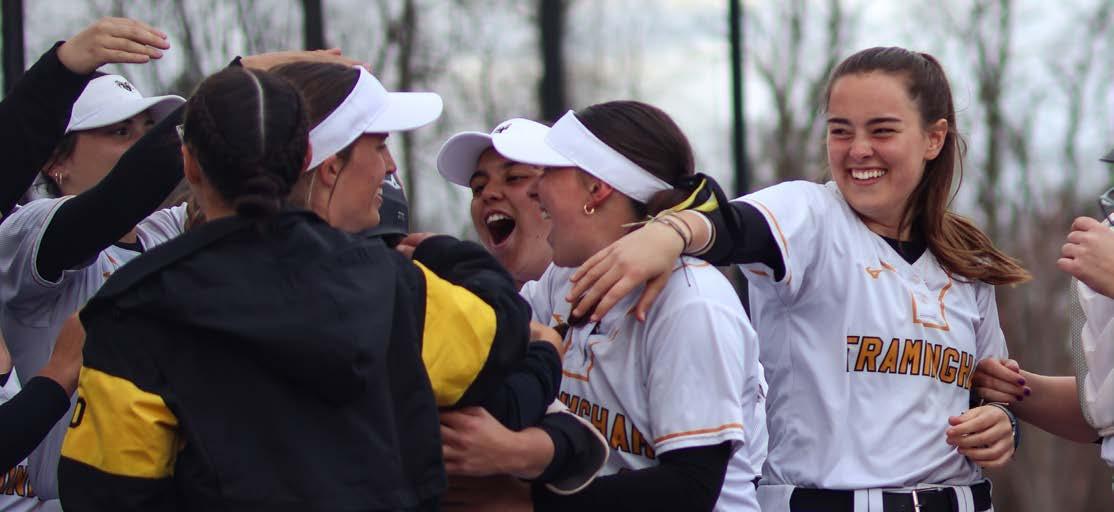
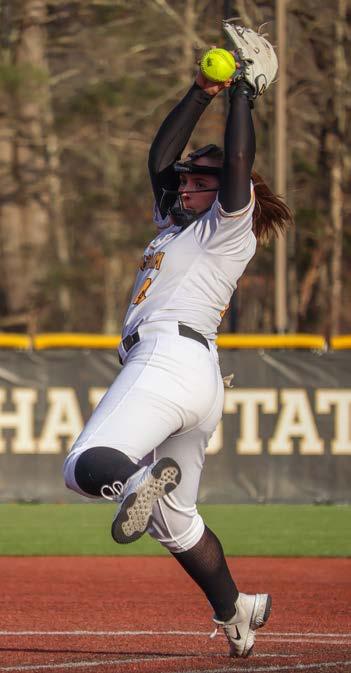
Gauthier walked away with nine recorded strikeouts and one earned run. She tallied six walks and her WHIP now stands at 1.53 and her ERA at 2.33.
“In game one, there was a struggle finding the zone and being loose in my pitch, but as the game continued I put more trust in my curve and change, which allowed me to get ahead in counts to get the outs we needed,” Gauthier said.
Game two against Simmons ended in a 9-6 loss for the Rams.
The Sharks scored four runs in the first three innings, testing freshman pitcher Julie Chisholm. This was Chisholm’s fourth start of the season and she boasts a 2.95 ERA.
The Rams scored a run on a fielding error in the fourth and got their own bats going late in the game yet again, as Rooney hit a solo home run and Carignan doubled to bring Pepe across the plate. Cadena also earned an RBI on a single that scored Carignan.
With the score locked at 4-4, freshman pitcher Sydney Bednarz made fast foes with the Sharks in the seventh inning with two doubles and a single bringing in an extra five runs for Simmons.
The Rams tried to mount a comeback, scoring on a throwing error and a single from Behrikis, but they ultimately fell to the Sharks with a final score of 9-6.
The Rams will face off with the Bridgewater State Bears in their first conference matchup of the season in a doubleheader at home March 28.
“The big task is getting the newcomers to see what Framingham State softball is all about. I’m really happy with how this team has fought through some tough moments and I’m excited to see how the next phase of the season plays out,” Miller said.
Stats sourced from fsurams.com and MASCAC.com
CONNECT WITH SOPHIA OPPEDISANO soppedisano@student.framingham.edu
By Izabela Gage Sports Editor
The Framingham State women’s lacrosse team took down the Keene State College Owls in a dominant 18-6 win on March 26.
Their overall record is now 3-4
The action-packed game for the Rams started off decisively, with Captain Leah Green, a senior, scoring a goal only 53 seconds in.
The Owls won the following draw, but sophomore Olivia Berggren stayed strong on the defensive attack, intercepting a pass and picking up the ball before passing it to junior Hailey Baker.
Baker ran downfield, passing the ball to junior Alessia Lye, who rocketed it from behind the net to Captain Maggie Grout, a senior, whose shot on goal was wide.
Baker picked up the ground ball before it went out of bounds, and the Rams opened up the field.
The ball was sent to Green who quickly connected a pass to Captain Molly Lanier, a senior, and she tried to find the back of the net, but it was saved by Keene’s goaltender Mabelle Bessette.
Possession of the ball went back and forth for the next 3 minutes of the first quarter.
The Owls earned a free-position shot, but junior goalkeeper Bella DiMare’s defense remained strong and stopped the shot with ease.
Keene remained in the offensive zone and tallied two more shots but could not get past the goal line.
The Rams cleared the ball from the defensive zone before the Owls received two green cards.
With Framingham on the extra man offense, Baker cradled the ball and hung back behind the net.
The ball was passed to Lanier while Green opened up and received it before sending it to Grout. Grout connected a direct pass to freshman Maddie Bosma, who found an opening in the top-left corner of the goal, bringing the score to 2-0.
The Owls received a yellow card less than 3 minutes later, and the Rams used it to their advantage. Grout deepened the deficit with her first goal of the game, assisted by Lanier.
With 1 minute remaining in the quarter, Keene scored on a free-position shot and broke their stalemate.
The Owls opened up play in the second quarter, winning the initial draw and scoring only 34 seconds in.
Framingham tallied two more shots, but Keene tied up the score less than a minute later.
The Rams fought for possession of the ball for the next 2 minutes, before the Owls received another yellow card.
Green used the penalty and found the back of the net, assisted by Baker, putting Framingham in the lead 4-3.
Framingham did not lose momentum, and junior Kelley DeBellis scored her first goal of the game, bringing the score to 5-3.
The Rams received two green cards and the Owls remained determined on the extra man offense and broke through DiMare’s defense 1:10 later, in an attempt to close the 1-point gap.
For the rest of the second quarter, Framingham stayed dominant in the offensive zone.
Only 34 seconds after DeBellis’s goal, Green found the back of the net
for her third time, unassisted.
Lanier met Green’s level of intensity, breaking through Bessette’s tough defense and scoring a goal of her own a minute later.
Green extended the Rams’ lead to 8-4 with another goal, assisted by Baker.
Framingham received a yellow card, and Keene attempted to use it to their advantage, but DiMare wouldn’t let the ball through to the net.
With 50 seconds remaining, Green sent the ball to the left side of the net behind Bessette and the Rams ended the first half in the lead 9-4.
Keene put in a different goalkeeper, Katelyn Nicotera, for the third quarter.
Lanier started off the action with a fast shot that hit the goal post.
After the Rams’ offensive reset, Lanier gained control of the ball and shot it right past Nicotera’s feet to bring the score to 10-4 only 24 seconds into the quarter.
Senior Kaleigh Houlihan gained possession of the ball and passed it to Lanier, who looked to add another point to the Rams’ lead, but it was unfortunately saved by Nicotera.
The Owls tallied two more goals in the next minute and 10 seconds, but Lanier remained dominant on offense and scored another goal for the Rams.
Framingham won the following draw and DeBellis attempted to find the back of the net after running downfield, but the shot was saved by Nicotera.
Green netted the ball twice more unassisted in the third quarter, one of which from a free-position shot, bringing the score to 12-6.
After a save by DiMare, Grout picked up the ground ball and cleared their defensive zone, before Lanier sent the ball to the back of Keene’s net.
Baker tried to score with 2 seconds left in the third quarter, but the ball deflected off of the goal post.
Freshman goalkeeper Allie Wurms was subbed in for DiMare in the fourth quarter and saved every shot she faced.
Wurms said she always does her best to cheer loudly for her teammates while on the sidelines. “This gets me hyped when I am in the cage.”
The Owls did not lose motivation, and tried to score twice back-to-back, but one shot was high and the other was wide.
Sophomore Lindsey Cox picked up the ground ball and Grout ended up taking a shot on net 40 seconds later, which was stopped by Nicotera
Keene received another yellow card, and Lye and Lanier both took shots on the net, but could not find the back of the net.
DeBellis finally found a gap in Nicotera’s defense and brought the score to 15-6.
The Rams remained relentless and a minute and 16 seconds later, Baker deepened the deficit with another goal.
The Owls received their sixth yellow card of the game, and Houlihan took a shot on goal that was saved by Nicotera. Green went for the rebound and scored her eighth goal of the game.
Green ended the game with the same energy she started it with, scoring with 1 second left, and the final score was 18-6.
Green found the back of the net on nine of her 10 shots against the Owls and tallied one ground ball and one draw control.
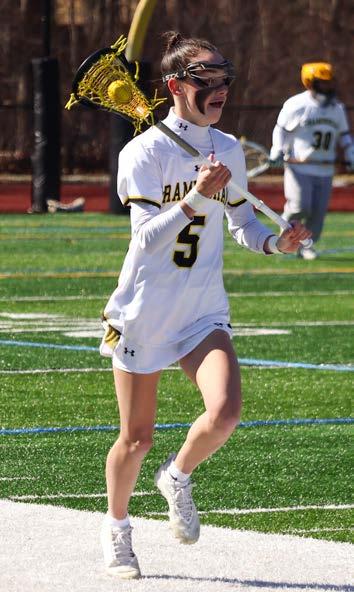
Green currently leads the team in goals and points this season, with 26 goals and five assists in seven games.
Baker is leading the team in assists with a total of 13.
The Rams outshot the Owls 37 to 20.
Green tallied her 200th career point in their 16-7 win against Colby-Sawyer College March 17.
DiMare hit 300 career saves in the Rams’ 15-6 loss against Endicott College March 19.
Lanier tallied 100 career goals and 200 career draw controls in their win against Keene.
Berggren said, “We are hoping to prove ourselves to the rest of the MASCAC this year, especially since we lost some vital players last year.”
She added, “Redemption in the MASCAC means coming back stronger, more focused, and with a bigger desire to prove ourselves this year. Our overall goal is to win the MASCAC this year while maintaining a strong team culture and resilience.”
The Rams are back on the road March 29 when they travel to Fitchburg State to face the Falcons in their first conference game of the season.
Freshman Haleigh Cyrus said she is “super confident going into conference play. Our defense has been really solid this year and we continue to grow every game.”
Berggren said, “We are really working on the little things that will help improve our game. These past few weeks, we’ve seen a lot of improvement in things like ground balls, talking, and good passes, but there’s always room to grow in those areas.”
Cyrus said, “The biggest thing for us is to really focus on the small thingsthe more we focus on those the easier the game will be for us. I think for the Fitchburg game in particular we are looking to continue our strong, solid play that we showed against Endicott and Keene.”
Wurms said the Rams are remaining positive and starting every game with “maximum energy and intensity.”
Stats sourced from fsurams.com and MASCAC.com
CONNECT WITH IZABELA GAGE igage@student.framingham.edu
By Sophia Oppedisano Sports Editor
The Framingham State baseball team has started their season with a series of non-conference away games. The Rams’ overall record currently stands at 1-12.
Their most recent matchups took place on the team’s annual trip to Florida where they faced off against nationwide competition.
Spring break did not yield any wins for the Rams as they went 0-9, getting shut out twice.
However, the Rams had a positive outing against the Knox College Prairie Fire March 20. After going down 1-0, seniors JC Espinal and Dane Frellick and freshman Massimo Mondi combined for a powerful offensive showing which yielded six runs for the Rams.
Frellick finished the game 3-3 with a double and Espinal went 3-5 with three RBIs and a double of his own. Mondi went 2-4 with two stolen bases.
Unfortunately, the Prairie Fire rallied to beat the Rams 7-6.
The Rams’ first win this season came in their season opener against Emerson College March 6. Senior Cam Prescott earned the start on the mound, only allowing four hits in five innings pitched and earning no runs.
Mondi went 3-5 at the plate with four RBIs and a home run while Steven Burbank, a senior, and Rosco Palmer, a freshman, both went 2-3.
The Rams bested Emerson 15-2 for the win.
Prescott and Mondi were named MASCAC Pitcher and Rookie of the Week, respectively, March 9. Mondi went 4-9 at the plate for that week, earning four RBIs, and three stolen bases.
The baseball team has a deep roster this season, half of which is made up of underclassmen talent.
Mondi boasts a batting average of .389 already this season and freshman pitcher Keith Ramsey has a 2.57 ERA over 14 total innings pitched.
Espinal has also found success early this season as he has posted a .405 batting average over 37 at bats. He is tied for a team-high eight RBIs with Mondi and Frellick.
The pitching has been a sore spot for the Rams with even veteran pitchers’ ERAs reaching past 5.00. The pitching staff’s combined ERA is 10.74.
The Rams will play in their first conference matchups away against the Bridgewater State Bears March 28 and 29.
Their first matchup on their home turf is April 5 for a conference doubleheader against the MCLA Trailblazers.
Stats sourced from fsurams.com and MASCAC.com
CONNECT WITH SOPHIA OPPEDISANO soppedisano@student.framingham.edu
By Francisco Omar Fernandez Rodriguez Arts & Features Editor
Arts & Ideas hosted “The Upside of Failure: Lessons Learned on My 30Year Journey to Overnight Success” by Erica Ferencik in the Alumni Room on March 26.
Ferencik shared her decades-long journey toward reaching book deals. She hopes that this event can help others learn from her mistakes and hopefully save some time and heartache.
“More than anything, I hope that you never forget to relish your journey, whatever that may be,” Ferencik said.
She doesn’t like the words “success” and “failure” so much that she had second thoughts on her presentation’s title, she said.
“They imply that unless you get to the tippy top of something you’re a failure,” she added.
There was a point when she believed the only true success for her would be getting published by a major publisher, Ferencik said.
But she quickly learned she needed to redefine “success” for herself if she wanted to maintain her self-respect and happiness, she added.
Throughout college, she had been an artist, she said. But when she turned 27 she decided to move away from painting and toward literature.
It’s difficult to get a reader’s attention for however long a book is, she said. But she wasn’t aware of that in the past.
“I was cocky. I thought, ‘I’ll just
write a book. I won’t think much about the plot, or the setting, or the characters,’” Ferencik said. She then mailed it to the editor of Random House.
“And the amazing part is he wrote me back. He wrote me back and said, ‘This is really bad,’” she said. The editor also said to keep trying.
Ferencik got an M.A. in creative writing at Boston University, and she once again thought she would get published quickly, she said.
Afterwards, she had to work several jobs while maintaining her passion for writing, she added. The list of jobs included bartender, waitress, real estate, construction, and more.
She eventually wrote a novel about a giant who lives in Central Square, she said. At the time, she thought she would never write anything better and that no one had ever worked as hard as she did.
She had an agent who pitched the book, but another novel about a giant was pitched at the same time, she said. Ferencik lost to Elizabeth McCracken, who wrote “The Giant’s House.”
“We can’t control any of this, right? It’s like, who knew that this would happen?” she said.
Her agent dropped her and the book, she added. Heartbroken, Ferencik swore she would never write another book.
Then she went into standup comedy, she said.
During her time in comedy, she learned that the crowd is like a bear, she added.
Ferencik said, “When I’m making you happy or making you laugh you’re
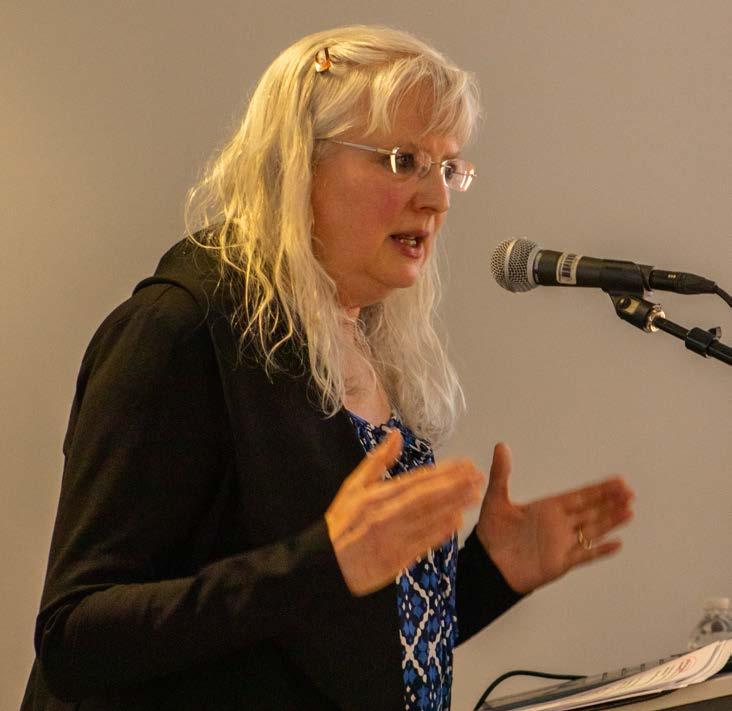
a nice friendly bear, cuddly bear. But when I’m not funny…”
She then switched from a picture of a teddy bear to a photograph of an angry bear.
Comedy is a conversation, so if she didn’t listen to the audience, she wouldn’t do well, she said.
People expect a joke every 19 seconds, she added. This helped her learn how to write jokes quickly, and to toss out what doesn’t work.
After standup comedy, she moved to screenplays, she said. Her logic was that they’re shorter and easier, but they ended up being just as much work.
Writing screenplays helped her understand story structure, Ferencik said.
The producer she worked for taught her to be careful about who she worked with, she said.
“We had a producer attached, but this producer proceeded to screw us,” she added. She didn’t go into detail on what he did, but she did say he’s in jail now.
After screenplay writing, she decided to move to Los Angeles to write for T.V., she said. But a week before she had planned on going, she fell in love with someone at a party.
She stayed and became a stepmother, Ferencik said. Eventually, she made a short film titled, “New Stepmom.”
From making this film she learned how difficult it was to translate words onto the screen, she added. It pays to have good equipment and professionals.
Then she returned to writing novels, she said.
She wrote a “memoir-ish” novel and got a new agent, Ferencik said. She agreed to the contract, but added she may not have read it.
The agent shared the rejection letters the book received, she added. But despite reading them at the time, she felt like she didn’t really understand what they said until years later.
At the time, she was devastated and decided she would never write another book, she said.
She worked in real estate and met a realtor, she added.
“She was kind of older, and didn’t really know how to use her phone, and she would do anything for a sale, and she didn’t understand the word ‘no,’” Ferencik said.
This lady seemed like a great character to write about, she said. But when she wrote the book, her agent didn’t want it.
Devastated yet again, she swore she would never write another book, she added. Despite the setback, she self-published the book.
Around this time she met an entertainment attorney, she said. The
attorney asked what she writes, and Ferencik said she writes “funny” and “scary.”
The attorney told her that she had to choose, and she initially refused, Ferencik said. But over time, she thought that he might have been right.
She wrote a book called “Repeaters,” which is about a young girl who returns from the dead to avenge her own murder, she said. It is self-published, because no one wanted it, she added.
“Nobody wanted it because in 2010 - at the time, supernatural wasn’t very hot,” Ferencik said.
She submitted the book to Kirkus Reviews, where it got named Best of 2012, she added.
The book was eventually optioned, which means a publishing company paid to have exclusive rights to the property for a specific period of time, she said.
But after she made the deal, she heard from Dreamworks and Universal Studios, who also wanted to option it, she added.
“So it was kind of like being perfectly, happily married, but then the best guy in the world walks by,” Ferencik said.
In August 2012, she was unemployed and depressed, she said. Her husband suggested writing another book.
Ferencik wrote “The River at Night” in 2012, then rewrote it in 2013, 2014, and 2015, she added. Six agents rejected it.
In July 2015 she sent it out to seven agents, and all of them wanted it, she said.
She sometimes traveled for book research, such as to the Peruvian Amazon and to Greenland, she said.
One of the challenges with writing novels is the competition, she added. This means both writers and readers.
“Forty-four percent of America read zero books last year. Yet, 2.6 million books were published in 2024. That’s 7,386 books per day,” Ferencik said.
There is also a bottomless need for story, she added. It’s needed for people’s emotional health.
Her first goal was to be published, but now her goal is to “stay in the game,” she said. It is also to believe that whatever book she is working on is worth the time she’s taking to make it and her readers’ attention.
“In other words, engage with the theme of this year’s Arts & Ideas series - have the vitality and vision to keep on going,” Ferencik said.
Continued from Page 1
“I hope President Niemi can learn something from me. I hope to give her a different perspective as a student. Most importantly, I hope she enjoyed our meetings and getting to know each other,” Crossin said.
Niemi said her experience in the program was “wonderful” and hopes “Emily will know that she can always reach out to me for career conversation.”
Niemi said she hoped Crossin knows she “has another person in her corner as she continues on her professional journey. I also hope she knows that I am deeply honored to have gotten to know her - she is so thoughtful and determined.”
Harris, class of ’25, said she was invited to take part in the program by Spezia.
“With the Trump administration, women often feel like their voices are not being heard. So I think being paired up with somebody who is wiser, more mature than us, and who has lived through more of these events than the mentees have, it gives us some insight into how we can take care of ourselves as women, and how
up in as many different ways as possible, whether it’s a program or a celebration coming together as a community, but taking a moment to pause and have a personal relationship, no matter what group you’re representing.”
Gobin, class of ’26, said she was paired with Stephanie Crane, director of Residence Life and Housing. She said she is excited to connect with someone she wouldn’t usually speak with on a day-to-day basis.
Gobin said her experience so far has been “great.
“It’s been great getting to meet and have a mentor that knows me but is also able to help me network for my future career,” she said.
She said she is hoping the program will help her gain another connection at the University as well as “gain valuable advice and knowledge on being a woman in a leadership role.”
Crane said, “At minimum I hope that she takes away that she has another support here on campus. I am always available to help answer questions, run ideas by, or just chat about random things that are happening.”
She added, “It was really cool to see how confident she was and willing to put herself out there to try new things. She will do fantastic things during the rest of her time at FSU and beyond
and helpful but you have no idea what may come about from those relationships.”
Nowak Borrego said, “I have enjoyed this mentorship program and I have appreciated the way Assistant Dean Spezia put together our opportunities to gather and learn from each other.”
Nowak Borrego said she hopes Griffin “will take away a piece of wisdom I may have shared as they traverse what is next. I also hope she will feel like she can contact me anytime in the future.”
She added, “I still connect with mentors I made during college and early in my career. As a first-generation college student, I had no idea that I could build a life-long relationship with people and women from college … I am very grateful for them.”
Rachel Rafferty, class of ’25, who was paired with Athletics Deputy Director Carey Eggen said her experience has been insightful.
“Carey is extremely knowledgeable and experienced in the sports industry. As someone who is just getting my foot in the door in the world of sports, having her to learn from is eye-opening and truly the best because she lives it every day.
“Through my experience so far I feel as though I have gained a true

we can support other women, other female students,” Harris said.
Harris was paired with Lorretta Holloway, vice president of Student Success, and is excited about working with her.
“I feel like I’m very connected with most, say 95% of the administrators here. I have multiple opportunities throughout the year to sit down and speak with other administrators, which I am very privileged and lucky to be able to do. But Lorretta Holloway, I actually have not had that much contact throughout my four years at Framingham State, and so it just happened that our paths haven’t crossed. So I feel very, very lucky to be able to be paired with her, because she’s not somebody that I have interacted with a lot before,” Harris said.
Holloway said, “Sophia is a treat.
“She’s really interesting. Really being able to talk to her about her plans. We worked on her resume, and I was like, ‘Oh, move this here. You need to emphasize this more.’”
Holloway said having programs such as this is important in recognizing, “that we need to lift each other
and I am thankful to have been able to get to know her!”
Crane said she believes it is important for programs like this to exist because “women have a unique experience out in the world and having a strong support network of other women is truly a powerful tool that helps to uplift us all and persevere when we face adversity.”
Marlee Griffin, class of ’25, was paired with Meg Nowak Borrego, dean of students.
Griffin said, “It was great to be able to sit down with her and have a real in-depth conversation. I told her my next steps since I’m graduating this spring and I talked about my plan to teach abroad in Spain. She could tell how very calculated I’m being with my plans for the future and commended me for having clear goals.”
She added, “It always helps to have someone believe in you and be in your corner. She also brought up how important it is to maintain the connections with people who have supported you in your life. Nurturing those relationships and reaching out every now and then is not only gratifying
derstanding of the role of women in sports and the value of carving out space for herself in this industry.”
Eggen praised Spezia’s effort in creating the program. She said Spezia is “consistently finding ways to recognize students and help them grow and learn. She is providing students with growth opportunities that bring faculty, staff, and students together.”
Caspian Barrett, class of ’25, was paired with Sara Gallegos, executive director of the Center for Student Experience and Career Development.
Barrett said, “So far it’s been really heartwarming, the get-togethers and meetings are the highlights of my week. They feel very personal and heartwarming, we all sit together and talk to each other, sharing coffee and snacks talking about our life experiences and our passions.”
Barrett said the program is important to her because, “the women in my immediate family didn’t go to college so it’s incredibly reassuring to talk to people who have graduated and become successful in their fields.”
She added, “Sara and her colleagues have been incredibly helpful in walking me through next steps for post graduation and looking at graduate schools.”
Gallegos said, “I think any student out there needs someone they can count on to just talk to, bounce ideas off of, ask any question, figure out their path, etc. I think a lot of our students now need more guidance in terms of how to interact with the world and build skills. Having someone who you can count on that won’t judge any question you have is important. The trust built between a mentor and mentee helps the student find their place in the world.”
Evelyn Campbell, class of ’25, was paired with Erin Jerrett, director of equal opportunity.
Jerrett said, “Evelyn is extremely bright and highly motivated. I do not doubt that she will go on to do great things in both her life and career.”
mentor.”
Rafferty said that even though Eggen and herself were paired in the program, “I truly feel that Carey is someone who I can lean on and learn from for years to come as I pave my way as a woman in sports.
“I hope Carey has come to see how much knowledge she has to offer to students who are looking to work in sports. She is extremely supportive and I believe students, especially women on campus, would benefit from hearing about her journey in the world of sports,” Rafferty said.
Eggen said she has learned so much from Rafferty. “She is incredibly determined and has the potential to achieve great things in sports management, marketing, and photography. She’s already launched her own photography business and is actively planning for its expansion. It’s been a rewarding experience to watch her grow, learn, and take bold steps toward her goals.”
Eggen said, “I hope she has learned the importance of patience, especially in a fast-paced world of athletics. I also hope she’s gained a deeper un-
She said she hopes Campbell knows, “That it’s OK, not to have a clear plan or path. As long as you keep an open mind, opportunities will present themselves.”
Jerrett said, “Every woman, regardless of age, can benefit from having both informal and formal mentors. In our busy lives, we often forget to pause and reflect on our journeys and the lasting impressions others have left on us. Speaking with Evelyn allowed me to step back and appreciate the impact that other women have had on my life.”
She added, “When women come together, they offer a unique kind of support that’s hard to find anywhere else. Whether it’s career guidance, goal setting, or networking, the power of having someone to talk to and share ideas with is invaluable.”
[ Editor’s Note: Sophia Harris is the Editor-in-Chief and Adrien Gobin is a Photos & Design Editor for The Gatepost. ]
CONNECT WITH DYLAN PICHNARCIK dpichnarcik@student.framingham.edu
By Ryan O’Connell Associate Editor
The Dean of Students Office recognized 31 nominees for the 18th annual Phenomenal Women award, celebrating women and Women’s History Month, and presented the award to Meghan Larkin March 27.
Rachel Spezia, assistant dean of Campus Engagement, welcomed attendees to the event and gave an outline of the ceremony, including recognizing the nominees, announcing a new leadership program, and a keynote address from the 2018 winner of the program.
“I’m so excited to be here. This is one of my favorite events to coordinate,” Spezia said. “I think now more than ever, coming together as a community and celebrating and lifting each other up.”
Spezia said it was extremely difficult for the committee to choose the winner of the award this year, and there were several “fabulous nominations” that “induced tears.”
Kianna Bauer, 2024’s Phenomenal Woman and the administrative services manager for the University Police, announced the winner in conjunction with Spezia.
“This year’s recipient had multiple nominations, … ‘She created an environment where I could grow as a leader, find my voice, and most importantly, make mistakes without being judged,’” she read.
“The recipient is one of the brightest lights in the FSU community. She truly embodies kindness and loves to empower the women around her,” Bauer read.
President Nancy Niemi gave the first address at the event, her approach to the stage backed by the song “I Am Woman.”
“‘I Am Woman’ is and will always be one of my personal theme songsI hope you have them too … and you play them when you need inspiration or hope or joy,” she said. “We’re going to continue to need these songs.”
Niemi said although women’s rights have come a long way, there is still lots of work to be done.
“The work of being equal, of having equality, is never done,” she said.
Niemi said this work allows women to do better than ever before, and encouraged attendees to achieve this by paying attention to “intersections.”
She added even today, there is still a debate in many segments of U.S. culture as to whether women should work, and how there is an underlying expectation women will become mothers and marry men.
The intersections of a woman appear when we consider her economic status, her religion, her disabilities and more, Niemi said. Because of their intersections, some women don’t have a choice in whether they want to work, she added.
“Let’s look at our intersections, our own, of our colleagues’ intersections,
our students’ identities, and let’s ask each other - ‘What does being a phenomenal woman look like and feel like to you?’” she asked.
Zae Valera, a 2018 graduate and winner of the 2018 Phenomenal Woman award, said for the people who know her, giving a keynote speech was not in her comfort zone.
Valera said her personal standards have always been very high, and rarely gives herself much grace.
She struggled with imposter syndrome, she added, and a voice that told her she doesn’t belong or she shouldn’t take up space.
“But over time, those who saw the potential in me before I saw it in myself allowed me to hold up that mirror,” she said.
Valera said she realized she didn’t need to wait for approval, not to be afraid to take risks, and that even phenomenal women make mistakes.
She added when she won the 2018 Phenomenal Woman award, she didn’t know she was ever nominated, and only went at the discretion of her boss.
“Before I could fully process it, I heard my name, and I was in utter shock,” she said.
Valera said it helped her realize the best growth sometimes comes from taking risks.
“Sometimes the best growth happens when you step into something before you feel prepared for it,” she said. “Most importantly I want to re-
By Sarah Daponde Asst. Arts & Features Editor
The Education Technology Office hosted an event on March 25 to teach attendees about Consensus, an AI tool of growing popularity.
The event, “What’s the Consensus? An AI Tool for Literature Searching,” was hosted in person and over Zoom. Steven Courchesne, co-coordinator and visiting assistant professor of the Educational Technology department, and Rebecca Dowgiert, reference librarian at the Whittemore Library, led the discussion.
Courchesne began the discussion by demonstrating how Consensus works.
He said users can ask a question and Consensus searches Semantic Scholar - another AI-powered search engine - and compiles the information into a graph to show how all the data differs.
“What makes Consensus a little bit different from the tools we’ve looked at in the past is it has a feature that tries to pull together a sense of what the research body says about this topic,” said Courchesne.
To demonstrate, Courchesne asked, “Are AI detectors reliable?” and Consensus pulled statistics from five different studies and put the results into
a meter diagram. The red part of the meter represented the data saying AI detectors are not reliable, and the green represented data saying they are reliable. There was also a yellow portion for “maybe.”
“It gives you this visualization to help you think about whether your question is going to go in one direction or another,” he added.
He said users are also able to ask more than just yes or no questions and Consensus will be able to find answers.
Consensus also has an AI analysis of key findings, said Courchesne.
“It breaks down some of the specific things that it found and it associates the citations with each of those findings,” he added.
Consensus lists suggested prompts, as well, to help users research further questions. “You could ask that question and then take a look at the related prompts to think, OK, what’s another way I could consider addressing this?’”
He said there is a paid version of Consensus, but he has only used the free version.
Courchesne said Consensus is a useful tool for studying literature.
He said he usually uses Consensus while writing his literature reviews to see if he is on the right path, but it is
mind you, as I remind myself, to give yourself grace, because you are worthy of every success and your potential is limitless.”
A new program, the Women’s Student Leadership Network, was then recognized, which paired students with a woman leader in the University community, offering a mentoring opportunity.
“Our goal was to establish connections, a support person to walk each other through the semester, and I’m certain we did just that,” she said.
Spezia thanked those involved and encouraged those interested in joining the program to reach out to the Dean of Students Office, as they are already recruiting for the fall 2025 cohort.
David Baldwin, director of Human Resources, and formerly the Dean of Students when the annual Phenomenal Woman award at FSU was created, then read the names of the nominees.
“I’ve loved this ceremony forever, ever since a grad student so many years ago - Amanda Emery - came to me with the idea and said ‘We should do this,’” he said.
“And to see it evolve from just a little ceremony where everyone just kind of showed up and milled around to this now, is phenomenal,” he added.
CONNECT WITH RYAN O’CONNELL roconnell1@student.framingham.edu
helpful at multiple stages in the writing process.
“A suggestion from my wife… ‘What if you actually write your literature review first and then you use this as a way to check up on what you did?’” added Courchesne.
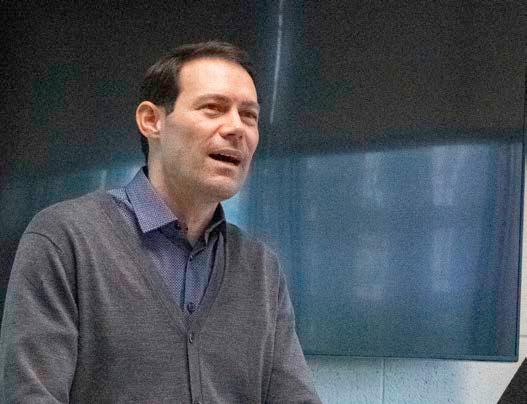
He said researching with Consensus after writing can help highlight counterarguments.
“If I was going to use this with my students to write a paper or to do a research project of some shape or another - at what point would be the right moment to introduce this kind of a tool with them?” asked Courchesne.
He added that he goes back and forth between wanting them to use it before or after completing the assignment.
Dowgiert said she used Consensus to research AI in higher education. The results varied on how efficient different AI tools could be.
“For the moment, it’s early days yet and many schools are ‘use at your own risk,’” said Dowgiert, referring to AI tools.
March 25.
She added that there is no perfect research index yet, whether it is AI supported or not.
“In two years, this product came a long way, and it may be something really interesting and different in a couple of years. We’ll just have to wait and see,” said Dowgiert.
Courchesne added users are able to ask one question without creating an account first, and 10 questions per month for free. There is also a paid subscription that answers an unlimited number of questions.
Courchesne and Dowgiert then invited attendees to try Consensus themselves and share their results.
CONNECT WITH SARAH DAPONDE sdaponde@student.framingham.edu
By Michael Trueswell Staff Writer
Released just a few months ago and directed by John Andreas Andersen, the Norwegian film “Number 24” is unique. Equal parts a spy, war, and biography film, it depicts the real Norwegian resistance movement during WWII through the eyes of its most decorated volunteer in the twilight of his life.
“Number 24” covers the life of Gunnar Sønsteby, a young Norwegian accountant who, after the 1940 invasion of his county, joins the fight with the resistance. He first worked on a resistance newspaper and eventually joined the British espionage efforts early on in the film.
There Sønsteby was assigned the codename Number 24 and worked to undermine the Nazi occupation of his country through subterfuge and intrigue.
Because of his effectiveness, Sønsteby quickly became a leader. He personally sabotaged arms factories, oversaw mass burning of conscription documents, and ordered and carried out executions of occupation leaders and collaborators.
The film starts with a much older Sønsteby giving a lecture about his life to a room full of teenage students. The film cuts between his time in the resistance and the lecture showing
the audience what Sønsteby doesn’t share with the room. The students’ reactions and questions offer a range of views, some completely disinterested and some very critical of his means of violent resistance.

Marcus Falcão / THE GATEPOST
The film uses these questions to return to the lecture, but spends most of the runtime with the younger Sønsteby. These edits from wartime to the late 2000s are utilized well and serve to remind the viewers that these events are still within living memory. On my first viewing, I assumed that this was an arbitrary choice. However, in the last few minutes of the film, it makes its inclusion clear and leads to a reveal that adds to the rewatchabili-
ty of the movie. It also further contextualizes how Sønsteby understands his decisions during the war.
“Number 24” depicts events in an honest and not glamorous way but instead shows the real risks and costs of mistakes during these sensitive operations.
Potential viewers should be aware that this film includes scenes of torture. The film does not linger on torture or brutality, but the film does not censor the abuse resistance fighters would face if captured. These graphic depictions are true to history and are included sparingly.
“Number 24” accurately depicts the realities of occupation and resistance activities. It includes the realities of life under occupation, economic hardship, and especially the constant fear of surveillance from collaborators who politically or monetarily benefited from supporting the occupation.
The older Sønsteby reflects on the tough decisions he made during the war and the people who gave their lives to the cause of freedom in Norway. “Number 24” stands apart from other spy films, being able to communicate to its audience the intense stakes of how terrifying it was to live under occupation and how dangerous it was to resist.
The casting in “Number 24” was done very well. Sjur Vatne Brean as
the younger Sønsteby and Erik Hivju as the older Sønsteby are entirely believable as the same person at different ends of his life. Brean captures Sønsteby’s precision and youthful bravery.
Although brief, Hivju’s performance is totally believable as being the same character having the same great qualities as Brean’s performance with a quieter portrayal of a man who has had decades to live with what he has seen and done in service of his country. The supporting cast is also effective in their portrayals of emotional scenes.

Rating: A-
“Number 24” is an intense time well spent
CONNECT WITH MICHAEL TRUESWELL mtrueswell@student.framingham.edu
By Owen Glancy Arts & Features Editor
It’s no secret to anyone who’s been tuned into the cultural zeitgeist that superhero media has been overstaying its welcome as of late. Whether it be due to the Marvel Cinematic Universe’s steady decrease in quality, or some other factor, people have begun to grow tired of costumed heroes.
Despite all of this steadily growing disinterest, according to box-office numbers, in superhero media, the animated Amazon Prime show “Invincible” has quickly become one of the most popular shows in the world, with season 3 being the most anticipated yet.
Season 3 picks up right where season 2 left off, dealing with the aftermath of Mark Grayson - aka Invincible - taking his first life in defense of his family, as well as the growing threat of the Viltrum Empire. Mark’s murder of Angstrom Levy weighs just as heavy as it should, with Mark fully dedicating himself to training under Cecil and the GDA both in order to save the world and to distract himself from his own heinous actions.
This emotional dilemma Mark faces is the trademark of “Invincible,” and season 3 continues the show’s exploration of the psyche of these superheroes and villains beautifully. The writing is at an all-time high with
this season.
Season 3 doesn’t forget about the side characters though, as many of them receive some much-needed attention and development. From Cecil’s backstory, to Rex and Rae’s budding relationship, to Eve’s romantic pursuit of Mark after he broke up with Amber last season, nearly every character is expanded on in a meaningful and important way.
The character with the most changes, however, is Oliver, who now has his powers and is attempting to work with his brother Mark. Oliver takes the typical sidekick stereotype and flips it on its head. With his advanced Thraxan aging, he begins to develop a bleak outlook on the value of life that directly challenges and clashes with Mark’s.
This contrast in views takes the brothers’ relationship to the next level, making both of them feel not just more real, but more human as well. This humanity is also extended to the villains, with antagonists like Powerplex bringing new perspectives to old events from seasons 1 and 2.
However, a show’s writing is only one piece of the very complex puzzle needed to make an animated show. The animation is arguably just as important and sadly, this is where “Invincible” has always been weak.
Seasons 1 and 2 had occasional bursts of visual excellence that were
surrounded by mediocre, but passable, animation. However, season 3’s animation is by far the worst of the three seasons. Characters move in awkward ways, action scenes are lazily shot and choreographed, and emotional moments are ruined by generic poses that look like they’re ripped straight from promotional materials.
The last two episodes improve the animation slightly, but only in brief spurts and about 45 minutes of good animation does not make up for the over 7 hours of poor animation that came before.
The poor animation quality is directly tied to the rushing of season 3. Fans were unhappy with the three-year gap between seasons 1 and 2, resulting in Amazon rushing production.
While we got season 3 earlier than anticipated, the show’s visuals paid the price.
With season 4 already having started production before season 3 was even finished, it seems like this trend of poor animation will continue into the show’s future.
The last episode also presents another minor flaw. While it serves the plot well, it undermines the intelligence of one of “Invincible’s” smartest characters. Luckily, this one poor character writing moment is nowhere near the level of injustice that the show’s horrible visuals have reached.
“Invincible” season 3 is the perfect example of the phrase, “two steps forward, one step back.”
The show’s writing only continues to get better and the plethora of new characters bring with them more depth to the show’s universe, but the animation and some minor moments of poor character writing continue to hold it back from true greatness.
David Abe / THE GATEPOST
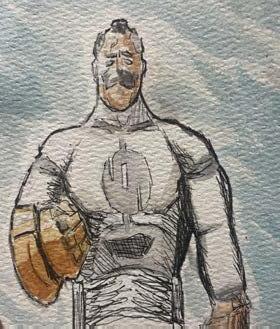

Rating: B+
Falls just short of expectations
CONNECT WITH OWEN GLANCY oglancy@student.framingham.edu
39. ___/her
40. Spanish uncle
41. One may be half off
43. ___ Curry, younger brother of Steph

44. Norse god with a horse named Sleipnir
46. Rep.’s opponent
47. Vintage film channel
48. Carried out
49. Give for a bit
51. Came about
54. Breakfast roll with myriad toppings
58. Texas NBA team that Victor Wem- banyama plays for
59. Court reporter, for short
60. Chatterbox’s “gift”
61. Idris who was People’s Sexiest Man Alive in 2018 DOWN
1. He’s a real deer
2. “Yeah, hard pass”
3. Title for no U.S. head of state, so far
4. Made fashionable
5. Tsp. or tbsp.
6. “That was embarrass- ing!”
7. “Am I speaking to a wall here?!”
8. Got out of Dodge
9. Audio brand
10. Mike and ___
11. One making a living from house money?
12. Ambulance alarm 14. Meeting, briefly
Wear away
16. Message that often arrives with a ding
Secluded valley
23. Tech review site and anagram of 23-Across
Shortage
“Makes sense” 26. Hollow, crystalline rock 27. Clay being of Jewish folklore
28. Young ___ (kids) 32. Subpoena, e.g.
33. “However,” in a 16-Down 35. Snazziness
36. B or C of the Spice Girls
37. (Clears throat)
42. Famous ___ Potato Bowl (annual game in Boise)
43. Knee boo-boo
44. Poems of praise
45. Melodramatic performers
47. Top parts of folders
49. Super Bowl X MVP ___ Swann
50. Name that sounds like a car
52. Nikola Jokic or Nikola Tesla, by birth
53. She sings “Into the Unknown” in “Frozen II”
Puzzle solutions are now exclusively online.
55. “Insecure” actress Issa
56. Olympic track star ___ Ali
57. Gooey lump


